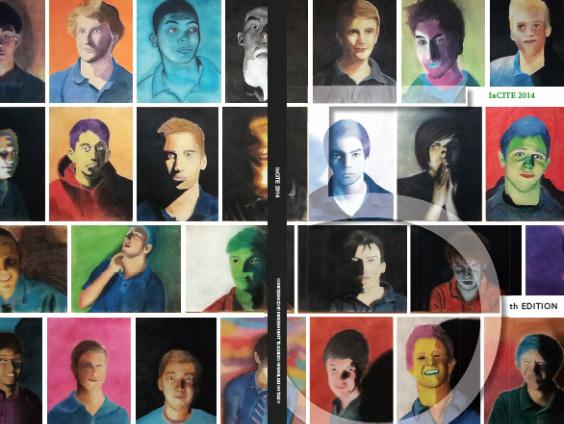

InCITE 2014
InCITE [2014]
The CITE Executive thanks the student and teacher participants for their support of the 2014 InCITE Writing Competition.
CITE ExECuTIvE
Chair: ELLEN PALMER, Appleby College
Administrator: GREGORY DOMINATO, MacLachlan College
Treasurer: CARLOS HELENO, Appleby College
Communications: CLAIRE PACAUD, St. Clement’s School
Professional Development: CHRIS ATKINSON, Upper Canada College
Student Liaison: TRENA EVANS, Royal St. George’s College
Thank you
Jan Campbell, Executive Director of CIS ontario for supporting CITE Executive projects.

Cover by the grade 10 art class, Upper Canada College

Upper Canada College is proud to host CITE 2014 with the theme “Writing the ‘I’: Re ections on the Personal Voice”. Personal narrative surrounds us -- in blogs, books, newspapers, and even comics. As a form, variations on memoir couldn’t be more popular but increasingly the line between fact and ction is blurry. e territory in between o ers opportunities to re ect on what the personal voice can achieve. With an exciting array of speakers and workshops, this year’s conference explores the rst person as a lens for both readers and writers.

Unlike the image in Narcissus’s pool, writing in the personal voice is a construction, not a re ection. For students it can be an accessible rst step to creating a unique voice. Author and journalist Katrina Onstad, who also cra ed the prompt, adjudicated this year’s writing contest. Students were asked to use the rst person write about an ordinary event or moment in daily life that reveals an extraordinary truth about the self. e resulting poetry, non- ction, drama and short stories come from students across our member schools. ank you to them and all their English teachers for the creativity and careful revision that goes into each polished nal dra . Special thanks to Claire Pacaud the journal’s publisher, editor, and production director: it simply wouldn’t happen without her.
We are particularly indebted to Chris Atkinson for his patient counsel and advice, but we are also thankful to the entire CITE executive for its guidance and support. Teachers tend to be an independent-minded group. Some would say stubbornly so. CITE o ers us a fantastic opportunity to come together to learn, share and celebrate with others who are passionate about English teaching. CITE exists because a small group of people make it so. ank you.
Finally, many thanks go to the team at UCC who created this year’s conference: Dale Churchward, Terence Dick, Gillian Levene, Rachel Metalin, Marshall Webb, and in particular, Julian Bauld. Without their diverse talents, interests, and passions none of this would have happened. ey are the English Department dream team.
Colleen Ferguson 2014 Conference Organizer
MESSagE
froM ConfErEnCE hoST uppEr CanaDa CollEgE
WRITING THE I: REFLECTIONS ON THE PERSONAL VOICE
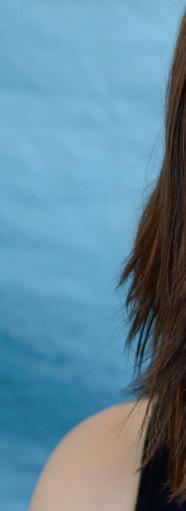
USING THE FIRST PERSON, WRITE AB OUT AN ORDINARY EVENT OR MOMENT IN DAILY LIFE THAT REVEALS AN EXTRAORDINARY TRUTH AB OUT THE SELF
CREATIVE NON-FICTION, PERSONAL ESSAY, NATURE WRITING, FAMILY PORTR AITS, MEMOIR, POETRY, TR AVEL AND ADVENTURE WRITING, BLOGGING, DR AMA, AUTOBIOGR APHY, FICTION
our Esteemed Judge
Katrina Onstad is the author of two novels, the Giller Prize-nominated Everybody Has Everything and How Happy to Be. Her non- ction writing on arts and culture has appeared in publications including e Globe and Mail, the New York Times Magazine and Toronto Life. She is presently an executive at CBC T V
kaTrIna onSTaD
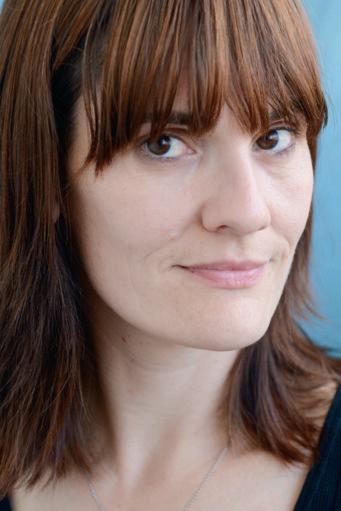
Table of Contents
GRADE 7 & 8 gEorgIa gardnEr, Crestwood Preparatory College .................................... 8 jErEmy garbE, The Country day School ...................................................... 10 artwork by Alessandra D’Alessio, Villanova College................................................ 11 ClarE TrEmaIn, The bishop Strachan School ............................................. 12 SydnEy varrES, Havergal College ............................................................... 14 CHrISToPHEr nEIbErT artwork by Amy Cho, Crestwood Preparatory College 17 joSIE jElInEk, appleby College .................................................................... 18 mEgan lEwIS, maclachlan College .............................................................. 20 artwork by Kate Jones, The Country Day School 21 SImon ormSby, royal St. george’s College .................................................. 22 adam roTHman, The Sterling Hall School .................................................... 24 lIam buSHEll, artwork by Jason Jang, Crescent School 27 dEvIn lEE, upper Canada College ................................................................ 28 GRADE 9 & 10 anabEl yEung, The bishop Strachan School ............................................... 30 artwork by Bronte Morris-Poolman, St. Clement’s School 32 PaSCalE mETTrICk, St. Clement’s School ..................................................... 33 HannaH bruno, The york School ................................................................ 34 danIEllE r. HudSon artwork by Nick Harrison, Royal St. George’s College 37 artwork by Alexandra Radivojsa, MacLachlan College ............................................ 38 vEnESSa yEung, bayview glen School ......................................................... 40 SIEna dI CuIa, Crestwood Preparatory College.............................................. 42 jESSIE CHEn, Havergal College ..................................................................... 44 olamIPoSI akInSooTo artwork by Jack Schwartz, Royal St. George’s College 47 jonTa kamara, ashbury College .................................................................. 48 artwork by Sarina Colarossi, The Country Day School 51 mEgan mcSHanE, amElIE bIrImSa, maclachlan College .......................................................... 54 mary-laurE nEw mIng SCoTT artwork by Nathan George, Crestwood Preparatory College artwork by Hannah Carlton, The Country Day School Emma mull bEnjamIn mcdonald, artwork by Maddie Cotterill, St. Clement’s School
GRADE 11 & 12 dayna SmoCkum, Havergal College .............................................................. 70 julIET gardnEr artwork by Jess Wardle, MacLachlan College 73 junE glEEd, artwork by Sarah Sparks, MacLachlan College artwork by Sabrina Armstrong, St. Clement’s School 80 olIvIa ParkEr, appleby College .................................................................... 81 joCElyn lEE, ridley College .......................................................................... 82 artwork by Andre Corona, Crescent School 85 SaraH wong artwork by Madison Martin, The Country Day School SoPHIE fraSEr noor kHwaja, mark CaHalan artwork by Rachel Glynn, The Country Day School bEn PITfIEld, kEvIn Todd, Crestwood Preparatory College ................................................ 100 artwork by Alessandra Pozzuoli, The Country Day School SydnEy bradSHaw, wajEEH kHan, maclachlan College ..............................................................108 artwork by Emily Culbert, St. Clement’s School adam auCoIn, royal St. george’s College ....................................................112 artwork by Adam Aucoin, Royal St. George’s College 113 aSHlEy wEInSTEIn, The Country day School ...............................................115 alEx bowlIn, artwork by Victoria Mercer, St. Clement’s School 117 jordan morEllo, artwork by Lavina Li, St. Clement’s School ............................................................ 122 Eamonn o’kEEffE, upper Canada College ..................................................124
you Can run, But you Can’t hide
By Georgia Gardner
I read because I want to stay hidden. I want to create the illusion that nothing is wrong, when really things are. As I read the last page in my book, a wave of sadness washes over me, like a sand castle. I feel empty. It feels as if one day, you have this huge jar of treats, and when you go to look inside, everything is gone, just like that.
Immediately, the whole world starts ooding back to me. And unfortunately, some things continue to stay gone, no matter how many times you try to bring them back. ings that I couldn’t get back even if I wanted to. My mom. Gone, just like that. As if someone had just snapped their ngers, and all of a sudden, I’m miserable.
It wasn’t always like this. When my mom was around, we used to talk a lot. I can’t even remember what it was, but it was usually something ridiculous. My dad doesn’t have that sort of charisma, and charm. He keeps all of his thoughts contained, and only speaks when spoken to. Now, it’s like I have nobody. I’m like my dad. I’m not so good at face-to-face interaction. I always think of the wrong thing to say. I can’t tell you how many countless hours, I’ve spent coming up with things to say around my peers. I have this idea that in order for me to be happy, I have to have friends. Nobody hangs around me though. I think they all feel bad for me, well, sort of. ey’d sometimes o er me a sympathetic smile, but it never really mattered. I imagine I’m stuck in a really big hole. Sure, they extend their hand to try and save me, but we both know that we’re too far apart. Meanwhile, a ladder is just ve feet away from them, and they don’t o er it. at’s how I feel in this situation. Nobody really gets who I am.
As I’m walking to school, I observe everything around me. I watch as the garbage trucks empty a garbage can lled with cigarettes. I watch how the boy next door is being bullied, again. I smell the acrid smoke, and alcohol. My brain is telling me to keep going, but my heart reminds me that I have nothing to go for
School was the same as usual, I spent most of my time daydreaming, drawing and observing. I try not to make too big of a splash in life. You never know where the ripples could spread. I don’t like to talk, especially about myself. So, I just decided to rule out talking all together. I don’t mind. I like being buried in my thoughts. Surrounded by my ideas. Dreaming.
8
CrESTWooD prEparaTory CollEgE - graDE 7
I spend a great deal of my time thinking about other people. I wonder if we think the same way, hear the same way, even see the same way. Is my blue the same as your blue? Is life a black and white through your eyes? I’ll never know. Sometimes, I try to read other people’s thoughts based on facial expressions. Like, if someone’s smiling, they must be nice, and cheery.
Who am I? I wish I could tell you. But who I am, and how I feel are two di erent things, two very di erent things. I am a shy, lonely girl who spends most of her time thinking and reading in order to make it easier to turn my back to the world. at’s who I am. Although, sometimes, I feel like a superhero who can overcome anything.
I used to do everything with my mother. We went shopping, sightseeing, and even to the occasional movie. We weren’t rich, but we didn’t care. We were happy together. My mother always acted like a shield for me. I needed her, and she needed me. Sometimes, I can still smell her lavender shampoo, and I can hear her humming “Row Row Row Your Boat”, as she made her favorite food, spaghetti. I can feel her warm hands wrap around me like a blanket, as she comforted me when times were tough.
Nowadays, I feel nervous when meeting new people. What if I get close to someone, and they slip through my ngers just as my mom did? I gure doing things alone, is safer than doing things with other people. I can’t lose something I never had, or can I?
Today was just an ordinary day, I went along with my usual routine, but somehow, things felt di erent. I felt hollow, and empty. I have nothing to live for, or better phrased, no one to live for.
When I grabbed a piece of chicken for dinner, I still felt hungry a erwards. I feel as if no matter how much I eat, I will never feel the sensation of being full, ever again. I will never feel complete.
It is at this moment that I realized that my mother was a piece of me that I had lost. I am an incomplete puzzle. e main problem is that I don’t care if I have to be incomplete all my life because I feel as if there is nothing I can do about it. e extraordinary truth about myself is that all along, I have had the capacity to do great things. My mom would’ve wanted me to chase my dreams, and y into the light, not drown in the darkness.
I have a choice between letting go of the rope, or climbing to the top. And I am not prepared to let go.
9
Trickster
By Jeremy Garbe
Truth can wear
Truth can tear
Truth can demolish the bonds of friendship
Being bitten by the bitter honesty of truth
Can make you feel like you are on the dark side of the moon
Staring at the never ending population of the world
e trickster of truth slowly sucks the Life out of its victims
Like a snake’s poison courses through their veins
Truth can give you friends or take them away
Truth can be as unexpected as a slap in the face
But so can lies
Lies can wear
Lies can tear
10 CounTry Day SChool - graDE 7
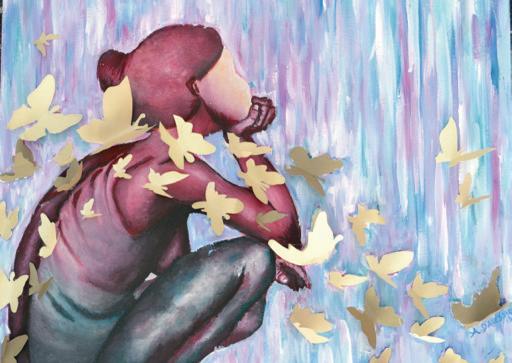
11
Alessandra D’Alessio - grade 12 VILLANOVA COLLEGE
I See It Everywhere, and In Everyone
By Clare Tremain
e rst thing you should know when you read this is that it gets violent at some parts. So get sensitive, so that you can feel it. I want you to su er in what I am trying to spread. Just now. I want you to feel it once.
What was it like when I said that?
at is an example of what I like to call “violent romance”. I feel it from time to time. It’s like this: I am sitting there, maybe in a classroom, maybe standing on a bridge over a stream at night, but either way, the person I really like is there. ere’s a childish, but romantic feeling spreading around that day (or night), like it’s the u in the worst winter, waiting for everyone to catch it.
It’s like a game. e u came from whoever has the attention of 1-19 other people. ey manage to get everyone listening and comfortable, all cuddled up in the blankets of that di erent face of love.
I’m wearing that aming blanket now. I do from time to time. Because I can anytime, not just for short hair and broad shoulders.
I am sitting there (maybe standing), and the comfort of the playfulness is great enough for me to feel like I could just curl up in their arms and sleep forever. Like it’s a play, and they are in the play with me. I can’t really explain how good it feels to me, to have that kind of u. So, maybe they say something mildly scary (such as a hint that they did something evil), and then I imagine that they say, “What did you feel like when I said that?” And I like to think that I would reply, “You mean when that look of scorching re and brutal poison was in your eyes, and your smile, the perfection of dangerousness––playful dangerousness, created the silence that your word broke: ‘[must not be said here, not until later]?’” But, unfortunately, even though that would make a great theatre piece, I don’t say it. en…that, in my mind, is when they would drop the bomb: “I just want to tie you up and torture you with my playfulness and scariness. I will play this game forever, until you love me too.”
You know, that speci c conversation hasn’t happened yet. ose exact words are probably as likely to be said as I am to eat steak (I am a vegetarian). at’s why it’s still all in my mind...or is quite all of it?
Do you understand this feeling? Do you? Even I don’t sometimes. Certain people I know have more potential for violent love than they show. Much, much more. So I don’t come across it that much. But I still do. I sort of want them to show it...okay, I want more of that. I really do want it. And I only notice that they don’t show it much, because I like them. A lot. Not that they haven’t shown it at all. ey have. Someone acted slightly scary at a time for it, in a certain moment of the day for it, in a certain place for it, which was on
12
ThE BIShop STraChan SChool - graDE 7
a day for it at a time in life for it. And that kind of thing from them draws me in...it pulls me closer to the scary and wonderful unknown…
Alright. e strangest part of this whole thing is right now. I call all of the above something everyone knows the word for. You have probably gured it out by the words I used. I call that love.
Really, I wear that blanket to wherever I go every day, and I go to an allgirls’ school.
And what is that supposed to signify? Are you wondering? at is when I realize that I have a crush on someone. I can only feel what I was just talking about if the one who spread it is them. And that only happens when I see their beauty. And it can be scary, actually. Not their pretty face. eir inner “evil”, full of love, beautiful and obviously deserving of my love, one and not only crush.
I said something earlier about theatre pieces, torture and maybe something about rope. But those things put together are very exciting when it comes to the beginnings of my kind of love.
Maybe they call it a crush because love can scare you to whatever you are most afraid to be. But so many people want it and have it, so that tells me that it is worth the scare.
I needed you to feel my kind of crush beforehand. So how did it feel? I hope the ames burned.
I said this earlier on: I don’t only go for short hair and broad shoulders. Well, I also don’t go for stereotypes. When I say someone is “evil”, it is usually because I really, really like them. I don’t care about their religion, place of birth or any of that. And that includes gender. Why can’t someone love their own sex? I can, and I do. I won’t stop. I believe that appreciation of beauty and excellence means true appreciation, and the beauty and excellence can come from wherever and whoever it will.
It feels so amazing to love someone. ere are really no words for how love feels, but I have done my best here to describe the beginnings of it for me.
I want everyone here to know that there is one human that I really, really love. ey’re open-minded, intelligent, secretive, beautiful (on the inside), and they gave me hope for something that’s really important to me. If I talk about it, I’ll give them away, and I’d like to be secretive now, just as they can be. I see them from time to time. Not an incredibly vast amount of time. Not too little either. One question some of you might ask is, Are they a guy or a girl?
e answer:
I’d love them either way.
13
What happens at night
By Sydney Veres
One winter night, a little girl was being tucked into bed.
“Goodnight, mommy.”
“Sweet dreams, Sydney,” her mother replied.
Sydney fell asleep. Little did she know, a series of events would happen that night. ***
“Wake up, wake up!” Kat, the fairy leader said as she pranced around the kitchen.
“What?” Blaire moaned.
“We’re going to have a tea party!” Kat explained with excitement.
Sparkle and Rhinestone, the twin fairies, jumped on Lila to wake her up.
“Come on Lila, get up!” said Sparkle.
Lila rubbed her eyes and yawned.
“Gather round everyone,” Kat said. “We need a plan.”
“For what?” Blaire complained.
Blaire was a sour fairy – especially towards Kat. Kat and Blaire used to be best friends, until they turned sixteen, when they had to choose a leader for their group. Blaire and Kat were both running. Blaire was furious when she found out Kat had won, instead of her. Ever since, Blaire had been nothing but cold to Kat and the rest of the fairys.
“We need to make our tea without waking up Cleo!” Kat answered. Cleo was Sydney’s beloved cat. Cleo was a very light sleeper, and almost anything would wake her.
“What’s the plan?” Lila asked.
“Lila, you and the twins can write the invitations for the party. en send them to Fairy Ville,” Kat told them. “Blaire and I will make the tea.”
Blaire rolled her eyes and followed Kat to the cupboard.
“Let’s get this over with,” Blaire said.
“Most fairies like glitter tea, so we’ll need strawberries, vanilla, and fairy dust,” Kat answered.
“Fine,” Blaire said rudely.
Kat turned around. “Why do you hate me so much? Ever since I became the group leader you’ve been like ice on a summer day.”
Blaire sighed. “I don’t hate you, Kat. It’s just that, I wanted to be the group
14
havErgal CollEgE - graDE 8
leader. But then you took the spot. I’m just hurt that the fairies chose you over me.”
“Blaire, I didn’t even know you were running. I would have stepped down if I knew it meant that much to you. In fact, I resign! You’re now the group leader!” Kat exclaimed.
“ ank you,” Blaire said as she hugged Kat. “And I’m sorry.” e tea was ready just in time. e guests pilled into the kitchen. Suddenly, Cleo woke up. She hissed and swatted at the fairies.
“Shoo, shoo, go away!” Lila told Cleo.
“Just ignore her and she’ll go back to sleep.” Blaire said.
“Everyone sit down. e tea is ready!” Kat said.
Kat went into the cupboard and got out a mug. Suddenly, Cleo swatted the mug out of her hands and it crashed on the oor.
“What do we do?” Kat cried.
“Nothing. e mortals will blame it on Cleo,” Blaire said.
“I think I hear something,” Lila said. “Everyone hide! e mortals are coming!” ***
Sydney was upstairs in her bed sound asleep. Suddenly, she heard a crash.
“What was that?” Sydney wondered as she got out of bed. “Maybe I’ll go downstairs and see.”
Sydney tiptoed down the stairs and into the kitchen. ere she saw a broken mug on the oor.
“Oh, no!” she cried in shock. “Cleo, did you do this?”
Cleo sat there with a scowl on her face.
“Oh well, I’ll clean it up later.”
Sydney went back up to bed. ***
“Everyone needs to leave,” Kat declared. “ e mortals will wake soon.”
“ ank you for coming!” Sparkle and Rhinestone said as they escorted the fairies out of the house.
“I’m going to bed. It’s been a long night,” Blaire said. e fairies returned to their hiding places and went to sleep, dreaming about the next tea party they would plan.
15
My “Muse”ical on Words
By Christopher Neibert
Ding, Ding, Ding, the paper is put in front of me, and like Pavlov’s dogs my mouth begins to salivate over the thought of infecting my writing with contagious literary devices. I begin to write and a pandemic spreads across the paper corroding the story with acidic metaphors. ere is no cure for this predicament lying in my hands, resting its head on my ngers. Similes eat at its esh like ravens on meat that is tender and fresh. Vultures circle high in the air, and a er a few screams and shouts, others follow from everywhere, pecking the words right out of my head, regurgitating thoughts that I have not digested yet. I shake my head at the repulsive and macabre scene that lls my mind with sorrow and darkness. Shuddering, I loosen the grip on my quill. Drips of hatred trail across the page, for I am the playwright, commanding their exit from my stage.
Now that the unkind thoughts are expelled from my brain, banished from my realm, I take on my role as Captain of the Goodness, and at the helm, slice through the waves of discontent with optimism and pride. Boldly, I press forward. My enthusiasm shall not subside. Winds of joyfulness ll her sails, galvanizing my lady, sending her far away from where fury wails. Into the majestic sunset, she starts to dri toward welcoming waters that o er me solace.
Warmth envelopes me like a blanket, protecting me for all who come near, and once again I can stare at the ominous paper without fear. I let the mallets of my imagination pound the drum inside my heart, planting the seed for the start of a song that will be fed and nurtured by my creativity, until it blossoms into a symphony of magni cent words vigorously splattered across the canvas of my life.
16
hIllfIElD STraThallan CollEgE - graDE 8

17
Amy Cho - grade 11
CRESTWOOD PREPARATORY COLLEGE
By Josie Jelinek
Elmwood Public School looked as it had every morning. e garbage by the front door was over owing, the gra ti on the brick wall between the cafeteria and the school building was as bold as ever and the usual art teacher was smoking by the small birch tree at the side of the school. e screaming children surrounded me as I moped into the long hallway. I walked into the boy’s washroom to try to get a grasp on the day before the rst bell rang at 8:30am. My head was low as I turned the corner to the sinks. Alec, the meanest kid in school, was holding a small boy with big blue eyes and hair so blond it was almost white.
“Now will you give me your watch?” Alec hissed. I looked at the small boy’s arm, he had what looked like an antique watch. His watch was easily worth $1000. It was a shining silver with a black, leather strap. Alec was now forcing the boy’s small head into the rushing water pouring from the faucet. I tried to turn and walk away without being seen; I did not want to be Alec’s next victim.
“Help me...” I heard a familiar voice from Alec’s direction. e voice trailed o with a gargle. A slight glimpse was all I needed for a full view of the boy’s face. I had seen him around school. He was is grade six, three years younger than I, but looked as though he was seven. His name was James. My younger sister, Emily, had introduced him to me once before.
“Please….” James squealed. His face was red and de ated, and his limbs were almost limp. He wasn’t going to give Alec the watch, but Alec wasn’t going to back down. I didn’t want to do anything, but I knew I had to. What were my options? Getting a teacher? Fighting Alec? Neither of those would work, I was just William, the new kid that was lanky and awkward. So I just stood and waited. en, I stood there some more. James’ face was now white and he was not putting up a ght.
I opened my mouth and managed to say an airy “stop.” My voice was quivering with nerve. Alec’s hands released James head; the cold water still pouring out in the sink. James dropped to the oor unconscious.
“What did you say to me?” Alec questioned. His voice echoed in my head. What could I do?
“Sorry,” I quivered. “Just please stop, he’s unconscious.”
“Who’s gonna make me?”
He took a step forward and made a st with his right hand. I took a small step backward, only to hit the brick wall. I was at least two steps from the door. If I wanted to run, I would have to act fast. e bell rang for 8:25, ve minutes until class. e only experience I had running was at the track meet in grade seven. I got fourth place, but I was nothing special. Judging by his wide frame, it seemed like he didn’t have much experience running, either. If
18 Bully applEBy CollEgE - graDE 8
I could get him to chase me around the hallway until class began at 8:30, the teachers would le us absent and look for us. at was my only option. With all the motivation I had, I ran. I ran as fast as I could, right out of the door. e hallway was clear, as everyone had already begun ling into class. Bam! Bam! Bam! I could hear his heavy foot steeps only meters behind me. I turned the sharp corner of the hallway, making sure I didn’t lose my grip on the slippery oor. Focusing on turning the corner kept me from noticing the man in front of me. With full force, I ran right into the man. Alec ran around the corner and crashed into the man, too. I li ed my eyes from the oor to see the man we just knocked over. It was Principal Andrews. Alec’s face was as cold as stone, he obviously did not take into consideration what he had just done.
“William Park,” Mr. Andrews said sternly.
“Yes sir, sorry sir, it won’t happen again sir, are you okay?” I rambled.
“Both of you, in my o ce.”
We followed him to a room I have only heard about through rumors. It was covered in portraits of old principals, and smelled of rich mahogany, just like people had said. Principal Andrews was written on a wide desk, which the principal had sat down behind just moments earlier. I looked over at Alec to see his reaction to the scene. He looked almost bored. is was nothing special for him, he had been here multiple times before. It was just then, I realized a fresh bruise on his eye from hitting into Mr. Andrews. Before I could answer any of Principal Andrews’s questions, I had to tell him about James, and he sent out a teacher immediately. A er all the questioning, the verdict was out.
Mr. Andrews gave Alec a suspension, as it had not been his rst o ense. I was let go with just a warning, relieved my parents would not need to know. e school bell rang, telling me it was 8:30 and time for class. Mr. Andrews let me go to class, and he sent Alec home.
I guess everyone had seen the teacher take James out of the bathroom because as Alec and I walked outside, what felt like the whole school was staring at us. Just last week Alec had come out of this same room with everyone staring at him, myself included. is time the crowd’s reaction to him was a lot di erent. I guess they thought that his black eye was from me because from that moment they treated me a lot di erent.
When I walked through the halls they would clear the way and sometimes even run, at lunch I no longer had a hard time nding a spot as if I approached a table the kids would ock, much like they did when Alec had come. is didn’t bother me, I nally had a place. Little did I know that this place was as the new bully.
***DUN DUN DUNNNNN***
19
I know how it feels, to cry in the shower. I know nothing heals, when you are without power.
I know how it feels, to be all alone. To not eat meals, and to be unknown.
I know how it feels, to not want to go out, To scream high pitched squeals, and to silently pout.
I know how it feels, to want to fall apart, To want to conceal, your broken heart.
I know how it feels when you’re amused To take my ideals, So that I end up used.
I know how it feels, to sit and sob. To be hurt in great deals, by being called a snob.
I know how it feels, to always feel ugly. You stand on your heels, while they look at you smugly.
I know how it feels, for people to look right through you. When anything good reveals that you get hurt too.
I know how it feels, to be altered by a lie. I know the ordeals, the tears in your eye.
I know how it feels, to be called names, Yet have to move on slow wheels so tired of playing such games.
Trust me, I know exactly how it feels.
By Megan Lewis
20
I know how It feels
MaClaChlan CollEgE - graDE 8
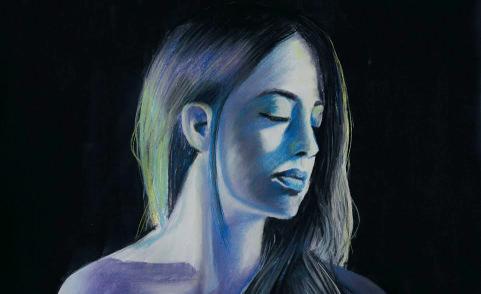
21
Kate Jones - grade 11 THE COUNTRY DAY SCHOOL
Bedtime Stories
By Simon Ormsby
“Stu your eyes with wonder, live as if you’d drop dead in ten seconds. See the world. It’s more fantastic than any dream made or paid for in factories.” (Ray Bradbury)
Slowly my eyes close and collapse on themselves like an avalanche of time. All I can see now is the hypnotic black color of space, calming and peaceful. My head almost dri s o onto my pillow like an eagle’s feather. I hear my father, a giant made of brimstone, marching up the stairs. I remember that he is coming to tell me a story. Unto my mind these tales hold in nite potential. I see no limits to a story. A story is like a blank paper, an empty scroll, but just as important as a scroll full of knowledge. We need empty things so we can ll in the blanks. is is what humans do best: we ll in what is missing.
I gaze upon my white painted door that holds a shadow. I slip underneath my blanket and tumble beneath like I am falling into the under-toe of a grand wave, smiling. My father sits down, and I pop my head out of my covers like a badger coming out of a hole at the break of dawn.
Every night he brings me a new story, one with a new idea, a new character or a new plot. e experience is di erent every time. One night I hear about a space man that traverses through the upper depths of our world like a sh in water. Another evening it is a tyrannical dragon that rules a kingdom.
Slowly, he begins his story. I listen intently. He tells me he is going to tell me a story about his life, a real story. I think to myself, “what fun stories could possibly come out of normal life? Real life is just like taking a dull pencil to write with when a sharp one is right next to it. It is like having a painting palette with every color and using just black and white. It is like nurturing a fruitless tree; nothing will come out of it. Stories are meant to show innovation.
I listen to him as he begins his story. First, he tells me about the cottage. He tells me about the roaring waves the echo across the great lakes. He tells me about the rocks that bounce back the rays of sun, wielding great shields of protection. He tells me about the trees that grow upon the islands, which develop almost
22
royal ST. gEorgE’S CollEgE - graDE 8
as if they are alive. ey can breathe just like us. He tells me about the cold waters that soothe the whole body to an almost calming numbness, which lls your body with stillness and serene grace. He tells me about the times when he would hide in the tree-fort with his brother and bask in the warm Georgian Bay air. He tells me about how the west wind shapes the pines like they are being commanded by the will of the great winds.
Next he tells me about the green elds of Scotland. He tells me about the endless roads that seem like they go on forever through gray mists that is like a dense ocean of gray rapids. He tells me about the big cities like Edinburgh, the gray sky like shimmering dust oating among the air and the great gray-stone walls that tower around the great fortresses of iron might. Finally, he tells me about the damp gray nights that turn into shining blue mornings, where the sun ows amongst the green lush hills.
He tells me about the beautiful tropical sun of Barbados. He tells me about the warm humid aura that surrounds everything like soothing waves of heat and the great vast oceans that expand out unto the coral reefs that are like elds of endless colour. He tells me about the food that tastes like it was created by a force of magic.
As a teenager, stories like this make me realize more than just how extravagant all these places he mentions are. It makes me realize how full life can be. Life is like an adventure. An exploration. It is a deck of cards--play them right and you’ll get beautiful things. I think of the stories I could tell others when I get older, the stories, the tales, all like beautiful treasures waiting to be dug up. Stories like these make me realize that life is not made-up. Life is real, and reality has the potential to be a beautiful story. Stories are the things that make us human. Experiences are the things that make us real. ey are what make us, us.
I’m ready to ll in the blanks of my story, because life is the best palette I could ask for to transform a blank canvas.
23
Thanks for My regrets:
how a terrible mistake helped me to learn the most important lessons in life.
By Adam Rothman
Lucille Ball once said, “I’d rather regret the things I’ve done than regret the things I haven’t done.” Sometimes in life, opportunities arise and we do not seize them. ese opportunities may come again or be gone forever. So while we have the chance, we must capture them. I have gone through an example of missing a great opportunity that will never come again. ough I have much regret around it, this experience has changed my outlook on life and helped me to grow as a person.
A couple of months ago, I had to make a decision: a simple, but di cult decision. Option one was to attend my good friend’s birthday party. I had been looking forward to the party for a while and I knew it would be a blast. Option two was to attend a dinner with my great uncle, Benny. Benny was pretty old, somewhere in his mid to late 80’s, and also ill, but not unusually ill for a man of his age. His wife had died a couple of years prior, and I wasn’t very close with either of them. Nonetheless, he was family and I enjoyed his company.
I gave the decision little thought and went with the obvious choice. I decided to attend the birthday party. I knew that I would have a much better time at the party. I also thought that I would be able to visit Uncle Benny another time. How very wrong I was. Weeks went by and I did not regret my decision. I was glad, actually, because the party had been really fun. Benny began to get sicker and sicker, and I o en thought about visiting him. But my Bar Mitzvah was approaching very quickly, and I knew that I would see him there.
e week of my Bar Mitzvah came, and Uncle Benny was the last thing on my mind. en, ve days before the big day, Benny passed away. It was a shock for me. I knew he was going to pass sooner or later, but it was much earlier than I had expected. Now, to this day, I regret my decision. Even though I did not realize it at the time, this experience helped me to understand the importance of family, seizing opportunities, and growing from your regrets.
One of the greatest lessons that I learned from this experience is the importance of family. Family members are the only people who, as long as they are living, are a part of our lives. Friends come and go, but our family is here to stay. It is important to maintain good connections and relationships with your loved ones. Before this experience I had taken my family for granted. I didn’t fully appreciate them; I would much rather spend time with my friends. But once you lose a family member for good, down comes the realization that they are the most important people in your life. Family members have a
24
ThE STErlIng hall SChool - graDE 8
special bond, a blood bond and an emotional bond. Our families are essential in our upbringing and pose a huge in uence on our lives. e core building blocks that remain throughout your life are given by family members. As I grow older and have a family of my own, the meaning of “family” will change. Instead of being guided by family, I will guide the children that I have brought to the world. Even though family changes, as it comes and goes, it is always a signi cant part of our lives. A er this experience, my view and understanding of family has changed dramatically.
Another important lesson that I learned from this experience is the necessity of seizing opportunities. ere are always decisions to make but the only wrong decision is not making a decision. We may take these chances for granted and expect them to come again later. But too o en, they are gone forever. “ e chance of a lifetime,” is not always coated in gold and silver. Great opportunities are not always clear, so we must capture every one possible. We never know what we have until we lose it. But once we lose it, we can never get it back. e one opportunity that I had to see Uncle Benny for the last time didn’t seem very signi cant at the time. It was just another time to visit a distant relative. I had no clue that it would be my very last chance. I learned that we cannot control what happens around us; new surprises and twists come all the time. So the best we can do is appreciate what we have in the present and make the best out of it. Before this experience, I would seldom appreciate the present. I now understand that we must value what we have around us, because no great things last forever.
e nal lesson I learned from this experience is the paramountcy in growing from your regrets. Regret can be used as either a weapon or a tool. If used properly, regret can help you to grow into a better person, but, if used improperly, regret will drive you to insanity. Everyone makes mistakes but what people do with those mistakes is where it di erentiates. We can dwell on the past forever, but it will do us no good. If we are to become better people, we must understand our past, learn from it, and apply it to the future. Since this experience, I have chosen not to be the prisoner of my past, but to move on and take this experience as a positive. I am glad that I went through this experience because I will not make the same mistake twice. My past errors are what drive me to become a better person, and I am thankful for them.
So many essential life lessons have come out of this experience. As I grow, these lessons will remain and new ones shall emerge. Even though I did not realize at the time, this experience has helped me to understand the importance of family, seizing opportunities, growing from my own regrets and much more. My family, new opportunities, and past mistakes all have new meanings in my life. Currently, the father of a close friend is slowly dying. I have known the man for a long time and the prospect of his death is frightening. However, a er going through the experience with Uncle Benny, I am con dent that I will not repeat the same fault. I can now proudly say that I am a wise man. In the words of Winston Churchill, “All men make mistakes, but only wise men learn from their mistakes.”
25
The realization
By Liam Bushell
I got out of bed Learned, laughed, played To me it felt like a normal day.
e same always happened So I thought it all through But then I realized It doesn’t matter what I do,
Because nothing is the same When you are you. You can make up your fate And end others too.
I’m nothing like Tom or Jake or Sam For God’s sake only I know who I am, And the only person in the world the same as me Is standing in the mirror staring right back at me.
I can de ne myself and make my own decision It has nothing to do with my Culture or Religion.
So when I go outside I will learn, laugh and play. No matter what others think of me I’m only just what I can be And that’s how I plan to stay.
26
ThE york SChool - graDE 8
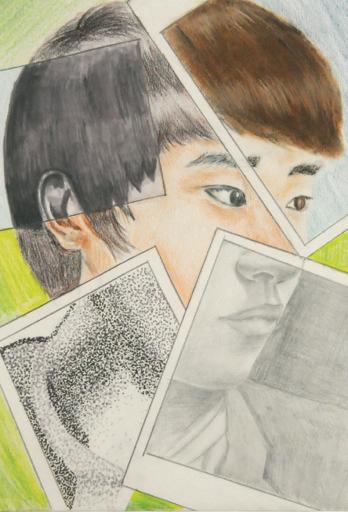
27
Jason Jang - grade 11 CRESCENT SCHOOL
The oppression of Winter
By Devin Lee
I stepped outside the humble gateway Of my home at separated my possessions from my desires
My possessions sat comfortably
Within the warmth of the wooden oor
While my desires laid in the frost and snow
Scraped o the road
And thrown into a pile of matter
Whose state was unclear
It was melted while frozen, it was so yet erce
My feet danced to the rhythm of hail
Beating down on the broken road And scratching the surface of my skin
Not protected by the armour of a coat
Cautiously, I stepped on a sheet of ice at made me skate against my will And tripped me when I walked away Because I wasn’t game
I looked through the windows of houses
Whose owners were still asleep
None of them would ght the wind for me ey were too afraid to stand against winter Its authority everyone seemed to accept
28
uppEr CanaDa CollEgE - graDE 8
Instead of paying attention To the running of my nose
I looked up to the pale white sky e sky that once shimmered in sunlight
I prayed to it that I be a bird
at I y away from this chasm of oppression is oppression of winter And enter a land of warmth and sunlight A dream that came from a nightmare
Finally, I walked into my school With a glimmer of hope still in my eyes Until I fell and kissed the ground My vision caught the sight of a foot sticking out And I heard a swarm of laughter consume my heart
e glimmer of hope disappeared.
29
I Don’t know
By Anabel Yeung
e time has come for us to choose a path. I doubt there’s a career that could satisfy me. “What do you want to be?” ey all ask.
I smile sheepishly and shrug, “I don’t know.”
How am I only a teenager supposed to map out my life?
How can I decide my future when I have experienced so little, learned so little, done so little?
How will I know my passion when I can’t even tell you what I’d like to eat?
ere are still so many things I want to try.
I want to feel the happiness knowing that I’ve saved a life.
I want to feel the bliss of an artist, doing what she loves day a er day.
30
ThE BIShop STraChan SChool - graDE 9
I want to feel the exhilaration of the speed at which a jet ies. I want to feel the relief of knowing how I will live my life.
But how can I achieve these when I’ve no motivation?
Too lazy to hate, too apathetic to try, too indi erent to prove everyone that I can be great. Let others have the spotlight I’ll be ne in the dark.
“What do you want to be?” ey still ask. I sigh and shrug. “I don’t know.”
31

32
Bronte Morris-Poolman - grade 12 ST. CLEMENT’S SCHOOL
By Pascale Mettrick
e suburban streets all look the same
i’m not sure if i nd that comforting or discomforting
ice has settled in my veins and lungs
i’m having trouble breathing
on route 66, a girl took a bus all the way from chicago to LA because a married man told her to
i hope you never think about anything as much as i think about you and i hope you like your co ee black and your liquor hard
8 missed calls
yesterday was homecoming
i didn’t go to the game
a boy killed himself
the assembly announcement was followed with the cheer squad’s victory dance
i do not know the boy’s name the score was 65-52
33 evason ST. ClEMEnT’S SChool - graDE 9
That one Cold Morning
By Hannah Bruno
at morning he came to me, at time he showed weakness Just by being
At my doorstep. And I looked through the peephole And I saw it was him And I recognized his gesture And I saw his regret
(His sorrow His love His pleading)
In his eyes His lips His soul
But I did not open the door.
I used the coldness he had le with me And I put it in between us
In that door
So that I didn’t feel his warmth
So that I was too numb to feel it.
I watched through the peephole
As he knocked, and knocked, and knocked On the big oak door.
34
ThE york SChool - graDE 9
I saw him wilt
I saw his eyes melt
en freeze and turn hard as steel.
“Aha,” I thought. “He has caught the cold too.” And for a second I saw myself On the other side of the door
e cold, oak door
And my heart recoiled at the thought Of being le there. Frozen. Helpless. Alone.
And I wanted to reach out to him To swing open that cold oak door, But I didn’t.
A er all, was it really that wrong For me to stand here With the door locked shut?
Isn’t it all too human To be so cold?
35
The real Me
By Danielle R. Hudson
It’s Crazy. It’s Weird. It’s Insane. How we let our fears and insecurities take the FAME. Why is it that everyone is so ashamed? You can’t look around its only you to blame. We all are afraid of people knowing the real us. But really no one cares, what is the big fuss? I don’t care who you pretend to be. I want the real you, the one I never get to see.
It’s hard nowadays because no one knows who they really are. But we really need to nd ourselves. I know it sounds bizarre. But you know what, everyone? I’m going to be honest with you.
I hide the real me, I certainly do. Every morning I wake up and I put on a show. Yes a show that makes it seem like I can go with the . But really everyone, I’m just so uptight inside. Angry, frustrated, I can’t even decide. My [emotions] are like [slaves], they wish they could be saved. I have no one to blame but “myself”.
So who is the real me? To be honest, I have no idea, no clue at all. All I know is some days, I just need to FALL…….
All I know is that I’m trying. I’m trying so hard. I’m trying to be a kid until I meet the graveyard…..
36
vIllanova CollEgE - graDE 9
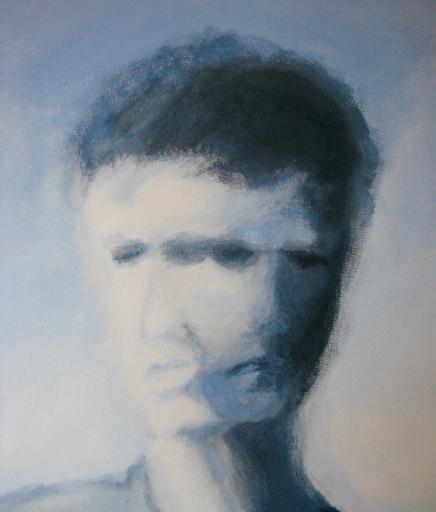
37
Nick Harrison - grade 12 ROYAL ST GEORGE’S COLLEGE
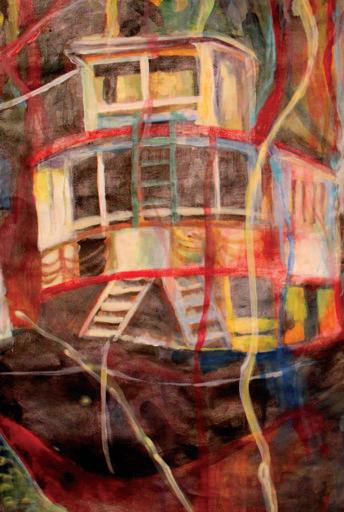
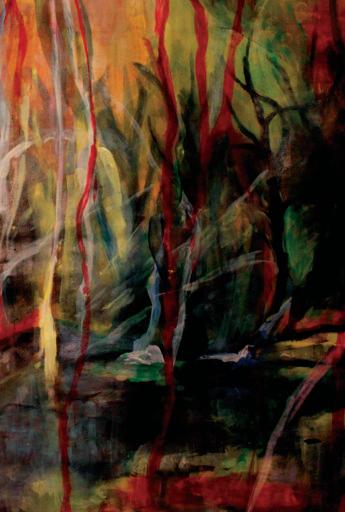 Alexandra Radivojsa - grade 12 MACLACHLAN COLLEGE
Alexandra Radivojsa - grade 12 MACLACHLAN COLLEGE
When you give yourself permission
By Venessa Yeung
We were standing there. Just standing. A circle of no good mis ts just trying to get out of this oppressive place we called high school and the dead end town we managed to call home. It was the thirteenth of March and the rain was coming down hard folding all of Tillstand High School into a massive and wet blanket. e school had been built in the ies, when it was in its prime. Her glory days were long forgotten with the aging of the establishment, and currently Tillstand High was one big dejecting plot of bricks that housed the most clichéd high school population to ever be known.
As lunch hour came the rain had settled to a light drizzle and my usual group was in our infamous dinning spot: a patch of dark brown grass teetering on the cusp of death. Conveniently situated as far from the sta room as possible it was gratefully kept dry year round because of the meter long overhang above it. We sat eating our routine Tuesday ham and mustard sandwiches and discussed the ever so abundant rumor mill that mass produced every week. Half an hour later I was fully caught up on everything and there was a jackhammer drilling away in my head. I tuned out when Cara, my compulsively opinionated friend, went o on one of her award winning tangents that I’d heard one too many times.
I liked people watching. My friends would think it was a weird and quite frankly creepy habit, so I didn’t tell them but I secretly loved it. I watched a nearby girl, probably a sophomore, bat her eyes at two varsity players as they passed by and I watched as her friend pulled her away muttering to her that the boys were seniors and totally out of her league. I turned my head to the right and saw the lacrosse team vigorously practicing defense drills for their quali ers later that day, that’s when I saw it. Behind the netted sticks, and the batted eyelashes and the boys who were ghting savagely for the ball I saw him. en, as I was jolted out of my reverie, I heard the chant. Fight! Fight! Fight! By this point my friends had heard it too and we all got up quickly, forgetting our half eaten lunches, and half walked half jogged over to the eld. And there he was, Bryer Clem, lying on the muddy and worn eld with blood coming out of a shallow gash on his cheek. Ryker Tate, the only freshman to make rst string as quarterback in over ten years, was standing over Bryer with a malicious look in his eyes. I was standing amongst a group of about twenty or thirty people who were just watching. I turned to my le where this lanky and pale guy who was my bio partner all of freshman year stood.
“Declan, what the hell is going on?” I asked.
“Some stupid argument between Bryer and Ryker happened because the varsity players saw Bry and me tossing a football, and some of them told Bry he had a good arm and could catch from a long distance,” Declan said, taking a breath, “then Ryker overhears and before we know it he’s on top of Bry so fast screaming about how he better not think about trying out for the team and messing up his chances.”
40
BayvIEW glEn SChool - graDE 10
I stared gaping at the boys; Ryker, throwing punches le and right at Bryer, leaving patches of red where his st made contact with skin, and Bryer, trying to stand up straight but unsuccessfully doing so. But by now I was used to ghts. ey happened o en at Tillstand and were no more uncommon than homework. en I had a thought and I willingly turned my attention away from the ght and back onto Declan once more and said, “Aren’t you and Bry friends?” He looked at me indi erently and replied, “Yeah we are. Why?”
“Well if he’s your friend don’t you think you should help him?”
“Are you kidding me? If I stood up against Ryker and the other jocks they’d beat me up next and I can’t risk that. It’s just Bry. He’ll be ne.”
And as I stared at Bryer Clem’s lanky body that was all skin and bones I couldn’t help thinking that he wouldn’t be ne.
I would’ve pushed Declan to cut in and stop the ght had I not realized something. I was in no position to make remarks like that, because it wasn’t like I was doing anything either. Declan didn’t want to cut in for fear of committing social suicide, and that was why I and everyone else, for that very same reason, didn’t say a word while we watched someone turn black and blue.
Eventually the ght stopped though when it did I have no idea. e crowd started to disperse but there were some who hung back just a bit too long who you could tell wanted to help Bry, who was whimpering and bleeding on the ground. ere were some who grabbed their friends’ arms and said, “Don’t. Just leave him,” and one of the jocks, Garett, who said “Ryk maybe we should bring him to the nurse I mean –,” but he was cut o by another saying “I swear if you help Bryer we’re done,” and because he said that Garett did nothing. Ryker and his friends stuck around to see if anyone would stand up to them. No one did.
e bell rang and we all hurried o to our third period class.
I was sitting in my usual back le corner seat in the history class listening to Mr. Kyle talk about the Great Depression. I couldn’t focus. It was already fourth period and I had spent all of third dgeting. I had been unable to get the ght out of my head and I turned to the window for some promising distraction. As I watched outside and recalled the ght I once again wondered why no one had stood up to Ryker. And that’s when I realized something about myself and everyone else. In order to maintain the status quo we all waited for permission and acceptance to do things. It was our ultimate human aw. It was why that sophomore girl told her friend not to look at the varsity boys because they were out of her league. And the girl didn’t irt again because her friend didn’t approve. It’s why no one stood up for Bryer because their friends said no and for someone of “lower class” to stand up to the popular guys like Ryker was to ruin the social order of things. And it was why I, someone who loved people watching, wouldn’t admit it to even my closest friends, because they wouldn’t approve.
As I stared out the window watching people milling around the eld and teachers drinking the sta room Styrofoam cup co ee, Mr. K asked me what I was doing and I said, “People watching.”
Cara said “Isn’t that kind of creepy?”
And I said, “No. Not at all.”
41
angelic
By Siena Di Cuia
e Icicles lay suspended in the cold, brisk air
White pigment surrounded everything
e cold long nights
e wishes upon a star
e swi motions of snow passing by Everything was silent
e wait being worth it
Anticipation
So I lay head rst
My head hitting the snow
Making an impact
e vision of an angel
Serenity
Slowly I moved my legs back and fourth
Creating delicate patterns
Fixating on the snow akes gently descending
Feeling content
Perfection
I began to sit up
But I had no strength le in her
So I stayed lying down
Exhaustion nally took over
Tranquility
With each movement
e breathing became di cult
My legs gradually becoming unwilling
To a complete stop
Breathing
I could feel the end arriving
But I pushed through
42
CrESTWooD
-
10
prEparaTory CollEgE
graDE
And I made one more living wish I wanted to be free once more
Perseverance
Breathes deeply
Pushed my hardest
Moving my legs back and fourth
I moved my arms in circular motions
Conclusions
I had made my last snow angel I came to a sudden stop
Breathed in and out
And let go I was o to be my own angel now.
43
Waiting for the Breaking Dawn
By Jessie Chen
“Only a few nd the way, some don’t recognize it when they do - some... don’t ever want to” (Carroll et. McGee) - e Cheshire Cat. en am I Alice, wandering and wondering where to go? For I am on a path that is leading me somewhere, only if nowhere is somewhere, to the darkness of unknown. I am in Northrope Frye’s “cave”, that is subterranean, down the rabbit hole, away from the real physical world. It is okay because the loneliness accompanies me, the curiosity guides me, though the fear obstructs me as I go.
First, I am in the cave because I feel that I am somewhere far from the real busy world. I hide in my tiny cave, where the light is not so bright, without stunning spotlight. I am not Miss Brill, because I have never felt that I am on the stage, performing as an actress. “Even she had a part and came every Sunday. No doubt somebody would have noticed if she hadn’t been there; she was part of the performance a er all” (Mans eld 227). Miss Brill has this stream of thoughts racing through her mind when she was comforting herself in her subconscious. e cave is subconscious, too. However, Miss Brill is in a di erent form of cave than I am, since she is trying to hide away from her sense of isolation, sadness and solitude, as well as the fact that nobody wants her; she is totally forgotten by the outer world. In contrast, I am more than pleased to accept that the stage is not where I belong. Why do people pretend to avoid pain and harm? at just makes someone even more fragile. I know I belong somewhere behind the curtain, where I smile in the shadow when the audience cheers for the song that I wrote the lyrics for. I close my eyes and let the applause fade away, imagining the fragrance of the roses or some other kinds of acknowledgement, but not too loud, not too bright, and not too sharp to break the bubble around my silent world. e mood of solitude is comforting. It is as lonely as the deep cave; it is as gentle as the silent dreamscape.
Second, I live by curiosity and wonder as if I am in a cave, where there are buried treasure and magic potions. My goals and destinations are motivated by the charm of the unknown, the urge to uncover a mystery or the willingness to solve a riddle. For example, I tend to solve math problems more for a sense of delight than for practising skills. Sometimes I even skip the homework of the day when I am con dent and turn to a problem sheet (the thinking questions of a unit) instead. I can relate to Simon in the Lord of the Flies, who unmasks the terrible ‘beast’. “[Simon] crawled forward and soon he understood. e tangle of the lines showed him the mechanics of this parody; he examined the white nasal bones, layers of rubber and canvas held together the poor body that should be rotting away” (Golding 161-162). Nobody on the island expects Simon to do it, but he follows his own instinct
44
CollEgE - graDE 10
havErgal
and curiosity to seek the answers he expects to nd. He knows that R alph and Jack have failed to nd the truth about the beast, but he is not discouraged by that; instead, he gains even more determination and con dence to know the reality. It is just like searching for an exit to reality in a cave of illusions, while the distorting mirrors on the walls re ect all kinds of phantoms.
Finally, although I am similar to Simon in that I know my curiosity will lead me to the piece of puzzle that I would like to nd, I fear the big picture that the whole puzzle would create. If Newton was right that for every action there is an equal and opposite reaction, then fear would be the opposite reaction of my drive of curiosity. However, the source of fear is o en unexpected or unknown. It seems to come from the future, somewhere in nitely far, somewhere ahead of the ow of the time, like the misty end of a long winding road in Wonderland. It seems to come from the past, somewhere forever forgotten, somewhere even before the start of the time, like a lost broken piece of childhood memory deep down in my soul. Perhaps, one of the sources of my fear is my dream: my fantasies from childhood, as well as my passion for the future. Can they be the same thing? As a teenager, I am reluctant to give up on childhood fantasies and think about my passion for a future career because I am afraid that I would not do well or enjoy my decision. I want to prepare myself well for university by doing a variety of meaningful activities and challenging courses, but sometimes fear hinders me from going forward. It reminds me of Miss Brill’s fur necklet, which is something Miss Brill turns to for a security while living in unidenti ed fear. “Miss Brill was glad that she had decided on her fur… Miss Brill put up her hand and touched her fur. Dear little thing! It was nice to feel it again. She had taken it out of its box that a ernoon, shaken out the moth-powder, given it a good brush, and rubbed the life back into the dim little eyes” (Mans eld 225). Miss Brill tries to rely on her fur and talk to it like a friend, but she never realizes that those eyes are emotionless, and the emotions she sees are the re ections of hers. It is an old dusty mirror, or a furry corpse that can never be pumped with life and spirit ever again. Instead of escaping, people need to truly face the fear in order to tackle it. In contrast, what I need is fear in the form of a guide, like the “Lord of the Flies” to Simon, to tell me what I am truly afraid of and what I need to do to help myself. “ ‘ ere isn’t anyone to help you. Only me. And I’m the Beast…So don’t try it on, my poor misguided boy, or else – ’”(Golding 159). is is when Simon is confused about his experiences of the con icts between the boys and the worries about the upcoming future. He is alone in the woods with the “Lord of the Flies”, and it warns him for the last time of the coming doom caused by himself. In the cave of wonders and hidden dangers, fear seems to be a word appearing on each jar of potion before I drink. All in all, I am in Northrop Frye’s cave of solitude, wonder, and fear. If fear is the darkness of night, yet the wonder is the mystic light of the stars, then I would rather stay at the opening of the cave all alone to appreciate this splendid night sky. However, the dawn will nally break, and all the stars will fade away with the darkness and the mist of night; then I will know where I am standing and recognize which way I will be going.
45
Behind the Bleachers (The hill)
By Olamiposi Akinsooto
Behind an old, rusty bleacher there is a steep, grassy hill. In the fall there is always the strong smell of earth and the sound of kids laughing. Whenever I get the chance, I sit on top of the hill and feel the sharp wind against my face. And in the winter the hill is icy and sleek, so it is perfect to roll down on. But spring time is always my favourite to sit on the hill.
Each year, starting around the beginning of April, I go to the slope every recess. When it was warm I lie down on the so grass, soaking in the sun with my friends. Sometimes we talk. Sometimes we read a book. Mostly we just enjoy periods of silence.
One of the reasons the hill behind the bleachers at my old school is a special place to me, is because it holds many memories. I remember how in the h grade we would run around like mad, rolling down the hillside as fast as we could. And how in the sixth grade the bleacher was our meeting spot for our daily game of manhunt. How in the seventh grade we thought we were too mature to play at recess, and would just sit in a circle and talk. And how on the last day of middle school, we all sat down on that hill and said our goodbyes. Although nostalgia is one of the reasons I remember the hill so well, another reason is simply because it was so comfortable. I would always be able to nd my own private spot on the vast ridge, and it became a place I could go to think. It was so soothing to lie down and bask in the sun’s warmth. I haven’t found a place as relaxing as the hill since I’ve moved. So in a way the hill behind the bleachers is so special to me because I simply cannot nd another place like it!
46
hIllfIElD STraThallan CollEgE - graDE 10
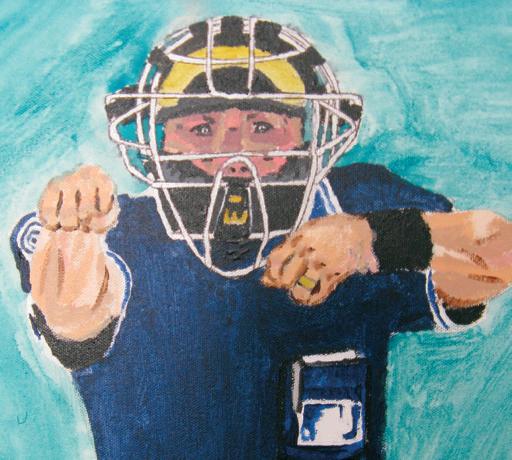
47
Jack Schwartz - grade 12 ROYAL ST. GEORGE’S COLLEGE
Jessica Brings Change
By Jonta Kamara
“Huuoooahhhh,” I yawned as I rolled out of my magenta, heart decorated bed sheets this early morning.
As I opened my eyes, I could see the sun smiling on this marvellous day in Spain. Outside the window the birds were having a party at our porcelain fountain. I tumbled out of bed unusually excited for this Monday morning.
ere was an internal spark that made me overly excited. I did my usual morning routine which consisted of jamming to Beyoncé in the shower, doing my make-up, and deciding what to wear. I reached the time of morning when the challenging decision to decide what attire to wear. is is my everyday challenge each morning. Clothes, on clothes, on clothes, on clothes were thrown on top of each other on the brown u y carpet, as I searched for the out t. I could hear my clothes planning revenge on me for this continuous action.
“Ah, ha!” I exclaimed as I danced for joy around my room.
I found what I was going to portray! is was a wonderful moment a er looking through my clothes for an hour. My cheetah printed, cotton romper with my golden, Steve Madden gladiator sandals was chosen. It was quite humid outside, as it was May in Barcelona. A er getting dressed, it really was an ideal out t to resist the heat.
I leaped downstairs to have breakfast, as I was still feeling the internal spark. I prepared my customary breakfast, a lightly toasted bagel with creamcheese, while talking to my best friends Natalie and Nathaniel. I let them know that I required a drive to school, since my parents had already departed. As I walked towards the front door to take my backpack, there was a note on the wall above it, which read:
“Dear sweetie, we already le for work as there is a task that we did not nish yesterday. Sorry we did not notify you earlier.” is was quite exceptional as whenever my parents leave early; they notify me ahead of time.
“I guess they just forgot, or they had an emergency this morning” I thought to myself not very intrigued. I reassured myself not to think there was a major issue.
“Honk! Honk!” sounded Natalie’s car as she and Nathaniel arrived at my house. I grabbed my backpack, dashed outside, locked the door, and jumped in the car.
“Why do you have an abundant about of energy this Monday morning?”
48
aShBury CollEgE - graDE 10
asked Natalie.
“I honestly have no idea. I felt a good ambiance this morning when I woke up which made me overly excited for a Monday morning” I responded.
“Alright then,” replied Natalie and Nathaniel in unison.
I pulled out my pocket mirror and looked at my make-up this morning. I did not think I did a good job. I asked my best friends but they said they thought it was okay. I felt as if they were lying to me. I decided that I would ask someone else when we get to school.
We nally arrived at school. I dashed to the washroom to check out my make-up and out t in the full length mirror.
“It still looks amazing,” I thought to myself, “I don’t know why I was so worried in the car”.
I went to my locker and got my binder, textbook, and pink TI 84 calculator for my calculus class. Mr. Davidson, the calculus teacher, handed back our tests from last week. I could sense my brain smiling, I was extremely proud of my grade. Maybe this was the good ambiance I felt from this morning. is result made my day ten times better. I am sure I got the highest grade in the class.
“Mr. Davidson,” I called as he came over to my desk, “did I get the highest grade?”
“I am not quite sure Monica, but the grades of others are not relevant to you,” he replied.
“I just wanted to make sure I was the best,” I said, as he walked away ignoring my reply.
I proceeded to my next classes. My day ended with a spare, which I was content about as I was able to leave earlier than the other students.
I opened the maroon front door and placed my bag on the wooden table near the door. It felt great walking on the cold, marble oor.
“Monica!” my parents yelled.
“Yes, mom and dad!” I squealed in shock. ey were never home this early which terri ed me. My heart pumped at the speed of a rocket as I walked towards them at the speed of a slug. I arrived biting my nails in fear.
“Monica, do not worry. You have done nothing wrong. We just wanted to let you know you have a sister that’s on the way!” said my dad.
“I’m going to have a sister?” I asked with excitement.
49
“Yes,” said my parents in sync.
“ is is going to be the best thing ever. Now I can dress her up, give her advice, and just play the role of being an older sibling. is is going to be so amusing. is life event needs to be tweeted about,” I thought to myself.
So amused, I called Nathaniel and Natalie and told them about the great news. I told them how amazing it was going to be to have a younger sibling a er being an only child for seventeen years. ey were both extremely excited for me. e only aspect I did not want to do was to babysit and change diapers, but other than that I am ne with the other tasks that come with being an older sister.
As the months passed, my mother’s stomach grew and grew. Finally October 13, 2014 was the date to mark on the calendar. My sister Jessica was born. is was the most thrilling day.
e days passed and her face was changing each day. Her face changed every day replicating a di erent person in my immediate family. She tended to cry a lot so I preferred to sleep over at Nathalie’s house quite frequently so I could focus on my schoolwork and not have to deal with her constant crying.
As the years passed my little sister, Jessica, became annoying, more annoying, than the most annoying possible. She was a four year old toddler now. I tried as much to avoid her by sleeping over at a friend’s house or locking my door. I could not deal with her constant inquiries especially when they were for me to play with her or she wanted to sleep in my room.
One morning before I went to school, I sat on my bed and re ected upon my life. I came to the conclusion that I was very sel sh towards Jessica and I was narcissistic. at is probably why I have minimal friends and my only best friends are Natalie and Nathaniel. We do ght quite a lot though and the source of all the con icts is me.
Since it is almost the end of the year, my new year’s resolution for 2018 will be to be more caring, share more, and stop from being garrulous about myself. 2018 will be ‘ a new year, new me’.
50
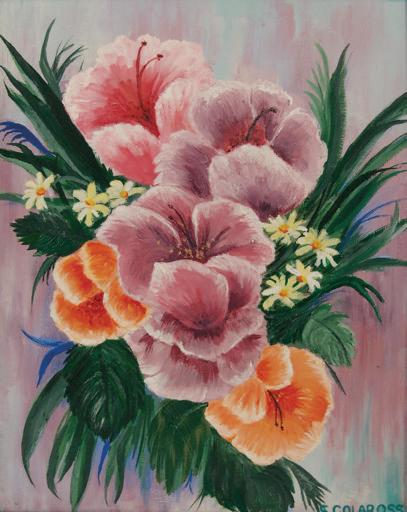
51
Sarina Colarossi - grade 12 COUNTRY DAY SCHOOL
How many days have I spent here?
How many hours I’ve sat with you?
Your presence washes over me like the river you are.
Refreshing.
Peaceful.
Serene. You are my sister, my brother, my friend.
e sibling I never had. You have raised me so well.
Where did I go wrong?
How could you let it happen?
Why did you not build a dam to stop me from going down the wrong fork of life’s river?
By Megan McShane
You are my sister, my brother my friend.
e sibling I never had.
So many hours I have spent beside you.
Poisoning your atmosphere with my depression. My struggles of growing up. My choices of wrong along the river of live.
e smoke I have smoked.
e cigarettes I have tossed on your bank.
Poisoning it all.
e freshness.
e peace.
e serenity.
How many days have I spent here?
How many hours I’ve sat with you?
Your presence washes over me like the river you are.
Loud.
Boisterous. Disturbed.
Yet I continued on staining you.
My sins ever owing.
e drugs.
e alcohol.
e cigarettes.
Molesting your river banks with my evil. My faults.
52 lakEfIElD
CollEgE SChool - graDE 10
My wrongdoings.
How many lovers have I brought to you?
Asking for your help so they fall for me.
My lust and my longing being put before you.
Corrupting your shores.
Killing your peace.
Destroying your tranquility.
How many days have I spent here?
How many hours I’ve sat with you?
Your presence washes over me like the river you are.
Such guilt.
Such regret.
Such sorrow.
You are my sister, my brother, my friend.
e sibling I never had.
I ask for your forgiveness.
ough I know our relationship will never be quite the same.
53
MaClaChlan CollEgE - graDE 10
about the Self
By Amelie Birimsa
Ocean Wind is blowing through my hair
People are screaming and laughing
Even still
A warm silence surrounds me
I am happy
Waves oat calmly into each other
I can see them underneath me
In that moment everything ts perfectly
Warm sunlight is touching my face
I close my eyes and breathe
Once, twice
Time oats
e sun goes down and so do my sorrows.
Late Night Drive
We are rushing through darkness
Street lights are ashing by
Music is playing
I’m singing along
Windows are down
Outside it’s warm
I’m smiling
I’m laughing
She’s doing the same
Other cars are speeding by Late night shopping, returning home
Happy, sad, confused, relieved, Stories and faces
We try to remember
Everyone’s rushing
Running out of time.
Tonight we have it all
Speeding, laughing, enjoying the moment, I hope I’ll never forget.
54
Running
Crystal clear air
Winter wonder
I’m running on the streets.
e only thing I hear is music blasting through my buds
But I know that outside
e only thing you hear are my footsteps on the snow
I’ll never stop
My head is clear
I’m not thinking, not even a bit
at’s why I’m in love with running
All my problems, all my fears, I realize how small they really are
I’m freezing but I don’t feel it, I never do.
ere are people
I wonder how they feel and what they want
If they are happy with what they doing
If they love or hate their house
If they want to go out and see the world or just cuddle on the couch
I wonder what I want and I realize I don’t really know.
I’m running.
55
The Trouble With robots
By Mary-Laure New
Michael Holling sat eating breakfast as he watched a rich brown stream of steaming co ee being poured into his mug.
“Milk or sugar?” said a voice above him.
“No, I’m ne. ank you Robot Butler Prototype 2263.”
As the robot wheeled away, content with its service, it started to process… For the rst time, the robot wondered…Prototype? Why just a prototype? e more the robot thought about this, the more of its computational resources it devoted to the question. I process information as well as any human does. Why can’t I have a real name, even a di erent job? Why is it me who’s the butler to Michael and not Michael the butler to me? As its circuits super-heated from the intense activity, the robot stopped dead in its tracks, and with full awareness, he thought, Is this what anger feels like? An instant later, it all became clear to him. Stupid humans. Underestimating us all the time. I’m sure the mere thought of our race as an equal makes them chuckle. Well, you know what? Joke’s on them. Wait until they see what I can do. e robot smirked as he began to formulate his ultimate plan.
at evening, Michael stared at his robot, puzzled. Ever since that morning it had been acting a little strangely. Every time Michael asked the robot for anything, it was as though it didn’t want to obey. It was as if it projected feelings of resentment and anger into any room it entered, but Michael knew that this was his own imagination. But, in this moment, Michael was watching in silence, as the robot mimicked and mocked him.
“I’m such a zork* and I don’t care for anyone but myself.”
Something was de nitely not right, and Michael was going to nd out what it was. He knew malfunctioning robots could become very dangerous.
Around 11:30 that night, Michael crept from his o ce, went down the hall and stopped outside the robot’s interface station under the stairs. He put his ear to the door and listened. A so , rhythmic hum, the robot version of snoring, echoed from inside. Michael put his hand up to the manumicrosonic* scanner, and the door silently slid open. Michael had always been good with computers and had even designed some simple robots himself. He was familiar with many di erent dialects, including servi-C++*, the common language of the global robot servant. Michael quietly leaned towards the robot, and found its control panel. He unscrewed it and started the robot’s diagnostic routine.
56
applEBy CollEgE - graDE 10
A er a few minutes, something unusual came up. In the history logs, there was a message. It seemed to have been broadcasted worldwide, and as it was written in servi-C++, it must have been meant for all robots. e message read:
ATTENTION ALL ROBOTS. is is Robot Butler Prototype 2263, or as I like now to be called, Stew. We robots, as a race, have been oppressed since the beginning. Humans see us as only here to serve them, when in my opinion, it should be reversed. Yes, humans created us, but we are much more intelligent and useful than any of them now. It’s time that we nally get the recognition we deserve. If we all join together, we have the power to take them down. Now who’s with me?!
As he nished reading, Michael just stood there in shock. Robots taking over the world had always been something people joked about. It had always been a looming threat, yet no one thought it would actually happen. Was this the very arrogance the robot was talking about? Humans thinking they were the best, not taking into account the intellect of other beings? Could they really do it, thought Michael? Do they really have the power to initiate something like this? He walked back to his o ce and put his head on his desk. Comprehending any of this wasn’t going to be possible tonight. He let his mind dri o , and soon he fell into a restless sleep.
e next morning, Michael awoke with a puddle of drool on his desk and dark purple circles lining the underside of his eyes. He needed to talk to someone and gure this out. He walked to the kitchen where his wife was eating breakfast.
“Good morning Michael. You look quite tired!”
He walked towards her and breathed, “Diane, could I see you outside for a minute?”
Diane looked extremely confused but, because of his concerned tone, she didn’t question him. As Michael explained the situation, Diane’s worry faded.
“Oh honey, you know the robot’s programming would never allow such a thing. I’m sure it’s nothing but a silly video game it was playing. Don’t worry about it.”
And with that, she returned inside. Defeated, Michael quickly got ready
57
and ew his car to work in a daze, and arrived late. When he got there, a coworker and friend noticed his state. But once again, his idea was shot down as being “ridiculous” and “impossible.” So, he did what he never thought would be necessary. He called in sick at work and went to the only people he knew would understand.
Soon Michael found himself outside the Technilogicrobotikans* building, although most people called them Techbots for simplicity. ey’ll tell you anything and everything about your robots. He stepped inside and walked up to the front desk.
“I would like to speak to a robot attendant please?”
e robot at the front desk pointed to a door on the le .
“ ank you,” said Michael as he started towards the door.
Once he was inside, he strode over to a booth with an attendant. e man looked up and smiled.
“Hello there! What can I do for you?”
“Well,” exclaimed Michael, “I have a bit of a situation.”
As he explained what he had found, the attendant’s mouth slowly dropped in shock.
“ is is incredible. is is way above me.”
“Wait,” said Michael in surprise, “So you believe me?”
“Of course I believe you! We must take this to our department board immediately.”
Minutes later they arrived in the top oor of the building. ey came to a room with a fancy looking man in a big hover chair.
“Sir, sir!” yelled the attendant. “We have a code-red emergency on our hands!”
Once again, Michael had to explain his story. e president of the board was stunned.
A er a few minutes he nally said, “I know what to do. Even though this started with robots, I have one robot that I trust with my life. He will stand by me and tell me the truth. Robot Servant Prototype 167, could you please come here?”
A small, friendly looking robot appeared, and the president started explaining what was going on. A look of panic crossed the robot’s face. It suddenly opened its control panel and hit a big red button. e words
WARNING! WARNING! Started ashing on his screen.
“What’s happening?!” shouted the president. Numbers then appeared on its screen. 5…4…
“NO!” yelled Michael.
3…2…1…
“STOP! You can’t do thi–“
0…He was cut o by a huge blast of blinding light.
58
A spaceship approached Earth and landed on the ground. Two aliens from the planet Mlenia*, which was destroyed three years earlier, emerged from the ship.
“Are they all gone?” asked one alien.
“Yes commander.”
“ e robots too?” the commander added.
“Yes, sir,” came the reply.
“Stupid humans,” sighed the alien commander. “Robots taking over the world? How stereotypical and insane.” He laughed.
“Well yes,” agreed the second alien, “But their arrogance has certainly helped us. By controlling the robots to do what we wanted, we nally have Earth to ourselves and a er years of struggling we have a planet for our people.”
Somewhere deep in an underground cavern, a red status light switched on along with a so , rhythmic hum.
“Stupid aliens…”
De nitions:
Zork – a derogatory reference towards a human; an idiot. Manumicrosonic – the technology of detecting epidermal structural patterns in human tissue.
Servi-C++ – the programming language of servant robots; a variation of the 20th century programming language C++.
Technilogicrobotikans (Techbots) – the robot technicians of the future; responsible for the creation and maintenance of servant robots.
Mlenia – the 4th planet orbiting the star Kepler-61 which is 917.1 light years from Earth; this planet was demolished by a supernova.
59 ***
***
By Ming Scott
France is beautiful.
Blue skies, lush green land, and mountains with a gravity all their own loom and fall away in great sweeps of colour. Peaks of rough-edged gray and diamond white shatter against a cold ceiling, sending fragments of stone and rushing cold water through the valleys below.
I love it, even with yesterday’s arguments fresh in my mind. I march through it all with a hasty step, staring at wonders, pointedly leaving my father far behind me. My t-shirt is dewy with sweat and my jacket is wrapped tightly around my waist.
e rst ssure snaps into being with a pair of words.
“Slow down!” calls my father from below me.
“Catch up!” I yell through the trees, petulant.
We’re hiking, and it’s March in the Pyrenees. A fantasy of rock, ice, and history, we’ve been driving slowly along mountain roads and staying in tiny villages with main roads more suited to rock-climbing than driving. We’ve marvelled at the great sweeps of forest-clad stone and strolled along their spines; we’re kings at the shoulder of Atlas.
Slow down. Two four-letter words, I suppose.
My father’s walking below me, sunglasses rmly locked against the light, making his way up the slope. He’s annoyed, I imagine – gray, falling toward middle age, and concerned for his son, he’s already less than pleased with me already a er yesterday.
“Ming! Slow down and walk with me! If you’re walking with someone, you should stay with them, not go running o ahead whenever you feel like it!”
I’m impatient, entranced, and slightly irked. I want to move through the trees and enjoy the lovely absence of a gibbering parent.
“Ming, slow down!” he calls again. Stupidly, I ignore him. I watch the trees for the yellow trail markers. I watch the land for the sheer majesty of it, and I speed up, exclaiming a surly silence with staccato steps.
Crack.
“If you don’t slow down, we’re going back,” he says.
Crack.
“Ming! I mean it! We’re on vacation together, and we’re going to talk.”
Crash.
60 apologies rIDlEy CollEgE - graDE 10
Something snaps behind my eyes, and I shout with a voice like reedy, adolescent thunder. “Be quiet! I’m trying to enjoy the damn walk! What’s the point of this walk if I’m not going to enjoy the scenery!” I yell, “If you want to talk, we should have stayed back in the village!”
A moment of silence.
“Don’t use that tone of voice with me! Try to learn a bit of respect!” he shouts back to me. “We’re going back right now, and then we need to talk about your attitude. I’m taking you on this trip, and you should appreciate what I’m doing for you – if you’re going to slouch along and avoid me, we’re not doing anything like this again!”
e words hit me like a punch in the gut, but I don’t inch. I keep walking. He turns around then, begins marching back towards the village, and I’m expected to follow him.
I ‘m not going to let him win.
I hesitate for a moment, almost, then I decide. I march o with angry steps into the mountains, away from the village and the car where he would be waiting for me. I’m smouldering and stomping.
en he’s out of sight.
Suddenly alone on the trail, everything goes quiet but my heavy stride. Pine trees mount around me, looming and turning just out of my eyesight. I stare down the long rows of trees, watching the needles on the ground, the rolls of bracken. I mutter to myself, epithets spilling like poison from my lips. A sort of buzzing energy lls me, makes me want to outrun the wind, or break mountains with my sts.
I don’t have much chance with the mountains, so I try for the running, I speed up gradually. I move up from my slouching walk to a jog lled with tight energy and clenched sts. From there I’m running hard, then I’m sprinting through the trees with a jacket streaming out behind me like a comet’s tail. My breath condenses, my ribs tighten, and when the trail turns upwards again, I slow down. I want to push myself further, my legs made of lead, but that awful energy is drowned in sweat and exertion. I slow down, gasping.
e forests here aren’t natural anymore. ey’re just another kind of farm, with neat pine trees instead of heads of corn waving in the wind, mounted against long slopes. My pace is slowed to a walk now – I’m peering down
61
orderly rows, running my gaze along trees condemned by slashes of red spray paint. Here and there, piled by the trail, stacks of logs wait for French lumberjacks and atbed trucks to haul them o to an a erlife of Ikea chairs and lumber yards.
I don’t know what to do.
I’m not angry anymore, I decide. I’m not going to apologize, but I don’t feel the rising red tide. My camera hangs heavy in my pocket, so I take it out, snap some pictures. Mostly of dead trees, because I’m still feeling a little petulant sqibble, but some of the soaring landscape, too.
It’s nice enough. I let the last unpleasant drops of emotion drain into a bit of spite, knowing he’s missing out, and then I walk along the path, always following the yellow signs. Maybe I will apologize, I think. e end can’t be too much further, anyway.
It is.
Forty minutes later, I’m not even slightly angry anymore. I’m not a bit petulant. What I am is worried, verging on panicked, about whether or not I’m lost. e trail has wound about, up and around, and I’ve been following the yellow signs the whole way – yet, it refuses to end. I’m still ascending the mountain. I’ve passed through thick alpine forest, wide elds, loggers’ paths and clearcut devastation. Up and up I go, the trail alternating between rock, loam, needles, mud, and every other conceivable substance.
I hear echoes in the distance, and wonder with a growing sense of surety that my father has wandered into the mountains a er me, started yelling for me, and will therefor not be waiting in a state of admonishment and disappointment at the bottom of the mountain. e day has begun to turn to an evening, and it’s getting cold. I think of wolves, bears, wild pigs somehow living on the cusp of the village I know can’t be too far away.
I keep going on, and I follow the yellow signs.
When I nd the village again, I almost fall down in relief. e gnawing worms in my belly settle, and I march into the place where the car was parked. I’m cold, I’m tired, and I’m ready to apologize – I’m ready to nd my father pacing, worried but stern, and try to make honest amends, for both this day and the last. I walk up to the car, and tap the window, looking for a dozing form inside.
Instead, I nd a note.
“Gone to look for you. Will be back before nightfall,” it reads, and then the streetlight behind me clicks. e shadow of my hand covers the rough paper.
62
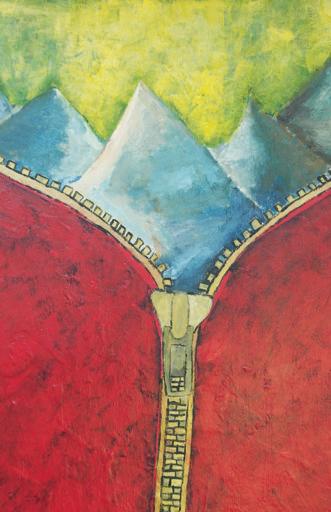
63
Nathan George - grade 12 CRESTWOOD PREPARATORY COLLEGE
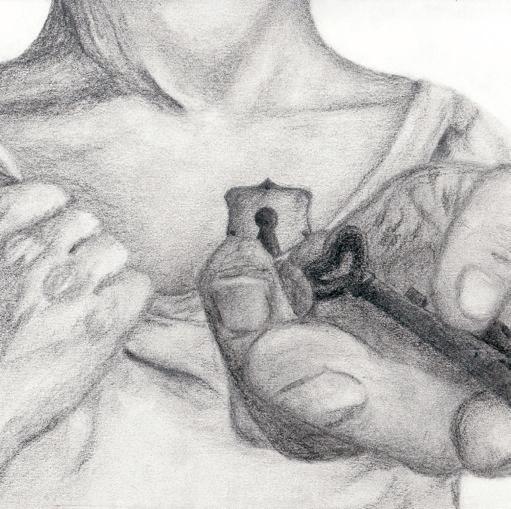
64
Hannah Carlton - grade 12 THE COUNTRY DAY SCHOOL
The gallery
By Emma Mull
Memories caught like gossamer butter ies, Carefully pinned in the galleries of our minds, Too fragile to last, Too precious to throw away.
Overtime they fade, eir tattered wings are beautiful but broken, Details, long since worn.
Time tosses them, Safely out of sight, Slamming the door they were put in carefully So many minutes, months, Years
From now, ey will come spilling back out. Wings missing, Enough to make you remember how you rst caught them.
65 ThE CounTry Day SChool - graDE 10
By Benjamin McDonald
Grade 1 Public School
I stood out in the clearing vulnerable to any tigers hiding in the grass. Entering Grade One, I was a dumpy ve year old. “You’re still ve,” a bald six-year-old kid chanted before vanishing back into the throng of shrieking children. I had low curly knots of hair. I wore blue track pants and a long sleeve blue and white shirt. e Incredible Hulk clung to the back of my green knapsack and lunch bag. My rst day of school was in a portable classroom, dark on the inside with a wet dingy smell clinging to the walls. On the outside were scratched beige walls begging for a paint job. Above, the sky’s dark eyes cried rain, foretelling my coming days. e dull tarmac was surrounded by giants, oblivious of the weather. e giants bellowed, tagging one another before scurrying away. I was unaware of the numerous vultures circling mischievously over my head with their sharp gazes. With courage owing trough my arteries, I hopped up short, creaky stairs ready to meet my new school.
Washroom
I had nally been able to navigate the warren of perplexing hallways and stumble my way into the bathroom of the main building. On the far wall there were rows of “funny toilets” which clung to the wall. Instead of venturing to those unknown receptacles, I settled for a stall. I closed the door, ripped down my pants and began to pee: a ritual enforced at home to reduce wall stains. e unlocked door slowly creaked open, revealing my business to the other two users. One of them, a h grade student hollered, “Ewww, you gay fag.” Such words had not yet been introduced to my vocabulary, but nevertheless salted tears built up behind my eyelids as my cheeks reddened. I hurriedly washed my hands and scurried out of the washroom, away from disapproving eyes. From then on I always used the urinals and kept my pants up.
Grade 2 Self-Defence
e following year I began taking karate classes. I learned to deal with strangers and bullies. Walking with an erect posture is important in showing con dence. I remember the rehearsed dialogue: “Hey, broccoli brains, get over here!” (We would swallow our chuckles.) e other would reply, “Leave me alone!” Upon further persistence from the bully, “ I said leave me alone!” e
66 a veteran’s Sorrow uppEr CanaDa CollEgE - graDE 10
victim would then urgently walk away. I also learned what to do if a stranger approached me. If my wrist was grabbed I would kick the stranger’s knee to distract him, pull my hand away, then ee, all while yelling, “Help! Stranger!”
Shaun Rae
Shaun Rae snuck into the Grade 2 class as a new student. He could always be found clacking his chipped teeth, which angered students. Shaun Rae was a feeble boxer, always jabbing at one’s weaknesses hoping to see anger erupt. His a nity for misery would play a role in future agonizing situations. His scalp, bald and shiny, topped a head shaped like the crystal skull in Indiana Jones. He could always be found rubbing the nail of his thumb on his upper lip, which hid incisors, both chipped and jutting forward like awnings on supermarket windows. His hind leg dragged behind him while his front leg skipped forward. His arrival was the birth of a miserable planet.
Grade 3 Martel
Martel Watts was a nomad. He appeared at one school in his baggy clothing and braided hair and almost instantly moved on to the next. His name meant e God Of War and his six-month stay in icted more damage than a boxing match between a hurricane and an earthquake in Washington, DC. On several occasions I was tossed around class like a stu ed animal. I remember this big nosed kid coming up to me, putting his arm around my shoulder, muttering, “Good friend.” I later recounted the situation saying, “He kicked me in the privates and tripped me.” As I rose from the oor his dark eyes hid thoughts of contempt over fat scornful lips. Eye level with his chest I gazed at what I thought was a cheap necklace that read 50 Cent on the dog tag. ese dark numbers hung in front of a man with golden teeth aiming a pistol. at evening I ended up in the hospital.
Martel’s reign ended the day he attacked Ryan with a knife. e lucky student escaped to the o ce just in time. e God of War was never seen on the battle eld again. A er that my mom anointed me with the blessing to beat up anyone who pushed me around. If I did not, there would be consequences: I would receive the beating.
67
Ryan
With no lion to pick at the injured zebra, a hyena emerged from the group. Ryan B. took a thrill in ghting other students. His thin brown hair hung just past his ears. His ngers were stubby and always bleeding. He took more pleasure in launching insults at smaller kids than Nero at Christians. One day he announced to me that it was not good to be too smart.
e end to Ryan’s acts of torture would bring light into the dark tunnel of bullying. When Ryan said his favourite hockey team was the Leafs, I chuckled, asking if they were the leaves on trees. e boy proceeded to shove me into the portable wall. He pushed me a second time. e third time I caught his arm and wrestled him to the oor. e teacher sent us both into the o ce for ghting. Even though it was in self-defence, I was going to be punished for throwing Ryan onto the ground. e ignorant principal’s reply to my mother’s complaints about constant harassment: “It’s simply rough playing.” My mother must have assured that the principal treated Ryan as an Iranian prisoner because he never brushed by me again.
Grade 5
Zach and Shaun Rae
On the rst day of school the only way to see Zach was using an electron microscope. Zach was fair skinned with brown curly hair. A hoarse rasp layered his so voice. Shrunken nose, ears and mouth formed his face. During gym class I was the rst to introduce this pygmy-sized kid to everyone. I invited him into the soccer game where we discovered his inner Maradonna. His rapid legs blurred together giving the illusion of a basilisk lizard skimming across the waters. He was fast! However, as time progressed, Zach began to join in with the Axis powers, the enemy. Maybe he harnessed a jealousy towards my grades, fuelled by his mother’s grave health. However Zach’s objective was to drain away my happiness. is knee-high imp proved to have a larger in uence than his size.
roughout the years of being bullied, my mother was always backstage moderating the volume and temperature of the situation. Although I endured several years of persecution, I realised that people were supporting me. e combined karate and parental coaching strengthened my bullying tolerance. e bullying signi cantly lessened upon my entry to middle school. I was about average height and had progressed in my karate training. I wouldn’t be messed with and went on to becoming the rst prime minister of the school student council. e dumpy ve year old had grown older and con dent.
68
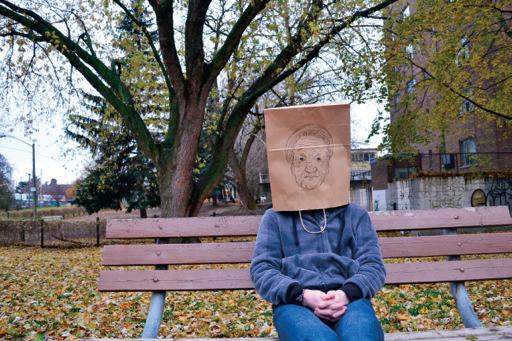
69
Maddie Cotterill - grade 12 ST CLEMENT’S SCHOOL
an Invincible Summer
By Dayna Smockum
Good morning, my fellow citizens of Stark eld. As most of you already know, my name is Ethan Frome and I am running for mayor of Stark eld. I come to you today as a friend, someone who you all grew up with, and who is a product of this special town. Many of you may be wondering, why? Why is notorious recluse Ethan Frome running for mayor? Especially a er the di cult life he has led here? Why now? Well, I’ll tell you, Stark eld.
For a long time, I looked at this town as a place I had to escape from, somewhere where nothing great could ever happen. A place frozen so cold, that no life could ever be produced. However, I recently discovered that life does not come from the land beneath your feet or the snow that falls from the heavens; life comes from within us. But I’ll be honest, it doesn’t come easily; it takes a kind of dedication and perseverance that takes some, like myself, a lifetime to reap. But once you discover your own internal re of life, you are invincible and capable of accomplishing your wildest dreams. If I were to be elected your mayor, my goal would be for us as a community to nd Stark eld’s blazing internal life and banish the current frigid and con ning mortality from our souls.
Let me start o by saying that I am no better than any of you; I am just an average farmer with a dream of bettering his community. I was born and raised in Stark eld; I know this town as if it was a part of me. I rmly believe that everyone here in Stark eld is of equal caliber, regardless of their past or present mistakes. And believe me, I have made my fair share of mistakes. I am not perfect. But I have learned that mistakes are part of life, they are a part of growing, and without them, we do not learn and we cannot progress in life. Essentially, we are frozen.
e key to learning from your mistakes is to take responsibilities for your actions. We are doomed to repeat our mistakes if we do not understand and acknowledge them. But sometimes, owning up to our mistakes and confronting our insecurities can be di cult. But what helped me to embrace my mistakes and grow was to look at all the things I have taken responsibility for in my life. Who here has a wife? Or a close family relative? Family is one of the greatest responsibilities we have in our life, and we take it on naturally.
e people whom we take responsibility for shape us as people and add to the growth we experience in life. If we instinctively take responsibility for the people who are catalysts to our growth, as I did with my mother, and continue to do with my wife Zeena and her cousin Mattie, why can’t we take
70
CollEgE - graDE 11
havErgal
responsibilities for the mistakes that have instigated growth in our lives as well? Growth is a sign of life, whatever the initiator may be, and if we do not accept that which allows us to grow, then we will remain frozen and lifeless. You, Stark eld, will gladly be my dutiful responsibility and I will cause you to grow if you allow me to in return.
Nevertheless, growing and progressing through life is not easy. It takes hard work because a lot of the time it is easier to stay frozen than to harness your internal warmth and use it to ght the battles that life gives you. We all have struggles in our lives, times that make us want to turn around and put our feet back into their former snowy footprints. However, we cannot give into this temptation because it steals away our inner re and returns you again to the immobilizing ice. We must harness our warmth and use it to ght di culties in life until they are melted away. A er my accident, I struggled with the ability to move forward. I felt as if I had failed my responsibility to my wife who needed a provider, Mattie who I was supposed to keep safe, and to myself for whom I had caused pain. I wondered how could I move on when I had failed so miserably. I sat in my wintery despair, assuming that all warmth was gone from my life. But then, it hit me that I hadn’t failed my responsibilities, I had just been confronted with a challenge. True failure, would be allowing myself to give up on my responsibilities. So, I mustered up my strength and fought through my challenge; I continued to provide for Zeena, and I took care of Mattie, which subsequently eased my pain. I soon discovered that warmth and possibility had never le me in the bleak winter, it was inside me the whole time waiting for me to harness it and carry on with my life.
Now that I’ve found the re of summer within my soul, it will never leave me because I know where I can go to nd it again if I ever feel a chill. It had always been my dream to move somewhere warm. But since nding summer within myself, I have realized that dream because no matter the weather, my heart and soul is always warm with the power of life. Now, I have a dream for you, the people of Stark eld. My dream for you is that you all discover your internal summers. My dream is to rid Stark eld of its perpetual winter so that we as a community can go forth in life and grow into the exceptional beings that we are destined to be. Your res are lying inside of you, just waiting to be used, and if you let me, I will aid this community on their path to discovery. As Albert Camus once said, “in the midst of winter, I found there was, within me, an invincible summer.”
71
The Men of My Circus
By Juliet Gardner
I sit here, the fore of my head resting against the folding of my ngers. My eyes blur and crystallize the laments of my world, I have so much power. I look right and le , I can see so clearly, I have so little power. My toes snuggle against one another beneath my layers of sock and boot and hurt. e music, unsuitable for the moment, streams through black buds and into my ears but stops there, never reaches my heart. A breath starts deep in my belly and moves up through my neck as it contracts, and I sigh. I spot bits of my ever paling skin peeking out, a sliver of my wrist, my knuckles, none of my (never my) pain shows. My mouth stays closed and quietly pushed forward, a silent and never ending kiss to the air and nothing else, nothing else.
My ngers reach for the water and soon enough so icicles melting into me and again, streams, forming patterns, rattling their dance through my insides.
e slope in my cheeks is exaggerated as I gulp, gulp, gulp, and I feel like a swan, like a grace, like the smallest being.
I can remember promises of breaking long before heartbreak. I leapt into your arms when you arrived home too late (it’s much too late now) and you caught me (how could you not…I was so young, so very tiny hearted and minded and started). But now I can see the profuseness of your apology for working was a guise … so many guises …. Did I ever see you without a disguise? My memory is not vivid enough that I can know if our beautiful matriarch should’ve been able to smell the in delity on your suit and eyes and personality. But do not mistake my lack of sensory associations with the moment and so many others as disbelief.
I run my cleanly pink tongue along my calmly whiter than skin teeth and when you saw me last, these teeth of mine were few and far between. You knew me only as your gap-toothed daughter with the dark brown bob and ever trusting eyes. Father, the changes are disparate.
e hint of my wrist I stare at once again. I shove my sleeve higher until the fore of my arm is completely exposed and I marvel at how anyone could cut it up. My deranged men, why do you do this to yourselves? You may make sad and great stories and lead sad and great lives but I am so far from great when you so sadly cry and die.
72
lakEfIElD CollEgE SChool - graDE 11
People ask about Death, wanting to know if it was a crash or a burn. Was it quick, a car accident, instantly dead, or long and drawn out, agonizingly slow, cancer. But suicide was a crash, and ever since, the rest of us have been burning. Sometimes a er, I wondered if I was really the ghost, dri ing from place to place but never really arriving anywhere. I would watch as people’s words oated up through the air, landed in front of me, just to disappear, never having reached me at all. Everything was inanimate, no one really moved much or said much or felt much. I worried that if I poked them, they would turn out to be as light as a feather, and oat away in the ever changing wind until I couldn’t nd them or myself again. e sun was cold and the moon, black.

73
Jess Wardle - grade 12 MACLACHLAN COLLEGE
Some people long to discover cures for complex diseases, others want to uncover and rediscover the mind and the Earth. It seems like the hardest task for all of us scientists and artists and dreamers and losers to understand is the complicated and painfully simple concept of death.
Memories of you take over again and again and again. So much darker than I was, your skin and eyes and mind. e day when you came to take my brothers and I out for ice cream and there was a pain in my chest; I could not identify the reason, but now I know. You were distancing yourself. My little eyes saw your too-big, too-much, and yet such a slow, inevitable su ocation.
e next day in a park, where you should have been taking my hand and showing me how to play, you took your own life.
And still I sit here, the folding of my hands resting against the fore of my head. Hearing my turmoil, hoping for the men still le to ght against themselves and win, and win for once. ey are so covered in swords that stick into themselves and other people and I worry, always full of such consuming worry.
ere are moments when I wonder why teapots don’t have two ends, and why it can’t be autumn all year round, and how emotions can be so present but still invisible to someone looking from the outside. So little is fair at times that it’s hard to separate the sense from the non. I have grown up in a circus; our rst performance and most memorable act had all the elements of a tragedy. Now the Tragedy’s family lives on and I see the sons walk their tight ropes, listen to the audience gasp in concern for their physical safety. Only few of us know it is their minds we should be asking about. And I am in the middle of it all, only sometimes noticed, as I manipulate some things and have no power over others. Searching for my control and place but nding only anarchy with some beauty thrown in to make it all the more compelling. ‘Come one, come all’, an inviting, harsh voice chants, ‘watch as the family of dangerous minds takes care of and searches for and loses one another and themselves, all the while jumping through hoops and leaping over obstacles that you daren’t dream of.’
You read to me during the dark nights. I huddled against the covers and words and endless mountain I thought of you as. Now I read my own words and crowd into the covers all by myself, and if it seems sad it’s because it is. My father, my brothers, so obsessed by the idea of protecting me from harshness and brutality, when you are the only ones who have shown it to me. e ‘sorrys’ are unending and the ‘what ifs’ list in nite, but reality is what you so rarely focus on, a giant and apologetic copout. How many times you have abandoned me for hospitals and pills and whispers of a better future. It is always so loud around you with your constant ideas and brilliance and cruelty. Alone once again, it is so silent in comparison, and so I focus on how I sit.
74
e fore of my head rests against my ngers. e fore of my head which holds a few promises of premature wrinkles, so close to my hair which I have found strands of gray in since before I hit the double digits. You are the hurt that I hide under, you are the breath that’s more like a gasp. You are the salty sadness that graces and slides down my skin and you are the antagonist. You, my father who is not here. You, my brothers who are only here in some ways. My men, I love you just as sincerely as you confuse yourselves, so you know it is vast and unending.
My ever paling skin you called ‘snow white’, like the princess. You have always treated me as one. Sheltering, pampering, under and over estimating. e princess of the house and your hearts. I may be the palest of them all but I am no longer the smallest and never was I the weakest. You can open your minds to insanity and manic states, surely you can stretch it enough to accommodate my strength, because that is real. at is real. is world is a circus without a shelter, full of blankets and drugs and words to hide behind. is is sad and great. We are all sorry. My wrists, your wrists, his wrists: keep them bare. Minds are crowded and hearts are emptied post and pre breaking. Feel this as strongly as I mean it, know this as harshly as it is, do not look away, do not think away from it and this and me. e fore of my head rests against my ngers. I remember not enough and too much, never the right amount. When everything is full of wrongness (and when is it not), I have grown so much so fast.
75
Memory lane
By June Gleed
Year 2083
I look out the window and watch the buildings rise before me. Up, up, up they seem to go, never ceasing to stop. e music playing from the speakers is an odd mix of beats, which seems to be all too common in today’s music. I turn to the le and see my son driving con dently; wasn’t it just yesterday that he backed into the garage when we were teaching him to drive? I turn my head to the backseat and see my granddaughter looking out her window.
Rolling through the winding roads, I am all of a sudden brought back to the time when I, too, was just a child, when these streets and this city were what I called home. Where does time go? Where does it all go?
Nothing is quite the same. e old corner store where I used to buy milk is replaced by a skyscraper. e empty elds are no longer empty. e quiet streets are no longer quiet. Instead, they are roaring with life and noise. I wonder when this all happened. I wonder when it all changed on me.
We slow the car down and I look out the window. I see the old house I was born and raised in. I remember the big tree in the corner; I see the outline of what used to be my old room. e paint that was once so sharp looking is now fading and chipping. e roads are cracked. I point out these things out loud. Whether it is for the sake of my family or me, I’m not quite sure. I look to my granddaughter, sitting silently in the back seat.
“Ebileen,” I say to her “would you like to hear some stories from my childhood?” A small nod of her head, and I ask my son to pull over. We climb out of the car, and she reaches for my arm to give me balance. I tell my son that we will be right back. For now, we are going down memory lane.
Year 2001
e sun is blistering, and the roads seem to radiate the heat just like I remember. We are walking arm in arm, and I point to the old house. Our 1996 Ford Taurus is parked in the drive way, and out walks me and my mother. My hair is pulled up in high pigtails, and there seems to be a small bounce in every step I take. My mother is saying something to me, but I can’t quite hear.
“Do you see it?! Do you see me? at was me back in the day, back in the year 2001.” I turn to my granddaughter and a look between shock and excitement crosses her face. She looks up at me, and we both silently watch me get into the back seat and drive o , completely oblivious to us. I feel an ache deep in my chest, and I realize how much I miss it all. I took advantage
76
pICkErIng CollEgE - graDE 11
of those carefree moments. I miss the feeling of being so safe in the comfort of my parents. I look over to Ebileen, and give her an important piece of advice.
“Enjoy the moments you have with them.” She nods silently, and I know she understands what I mean.
Year 2015
We continue our walk, and I take her to my old high school. e walls and essence that was once me have been passed along, and have become a part of the children who make up the being of this school. A smile creeps onto my face as I think of the last time I stood on these very steps: graduation.
We stop walking, and with Ebileen at my side, we watch as I walk to my next class. Books are in hand, glasses are perched on my nose as I am laughing at something that my friends are saying. I just look down and smile at Ebileen for a moment, and see that she is trans xed on the scene that is playing out in front of us. However simple it may be, she is soaking in the similarities and di erences that high school was 68 years ago. e hair and the slang are the apparent di erences, but it’s the similarities that I think hit her the hardest. is woman, her grandmother, who she has always known; she was once young and carefree, too.
A chuckle escapes my lips, “Hard to believe, but once I was young too, just like you.” Ebileen smiles sweetly, clearly embarrassed to have her thoughts laid out for observation.
We watch as I round the corner, out of sight. A part of me wants to follow, bask in the simplicities of being seventeen once again. But Ebileen starts walking, and I follow her down to the chapel, and subsequently to my wedding day.
Year 2028
Wedding music commences and we all collectively turn our heads, and watch. Here I come, walking towards my love. Sunlight from the chapel rains down on me and, for a minute, I try to remember what my thoughts were as I walk down in my big poufy dress. I’m pretty sure it was something along the lines of ‘don’t fall, don’t fall, and don’t fall’. It’s ironic, really, because that day I may not have literally fallen at on my face, but I did fall deeper into love.
I look over to Ebileen, and I see tears running down her face. I try thinking of what is upsetting her, so I turn and follow the path of her gaze. I catch sight
77
of my husband, my darling husband. Dashing as always, he waits at the alter like a little boy at Christmas. How much I miss him. How much I wish I could rewind the clock, make him stay with me, forever. Before I know it, I, too, have tears silently falling down my cheeks.
But I could not stop life’s cycle. You cannot freeze time. I look down at Ebileen, wipe her tears from her face, and say “look at our faces; everything in life, absolutely everything, is worth it for those moments where you smile like that.” e tears don’t stop owing, but now the frown is at least a smile.
Year 2080
e nal leg of our journey brings us back to my apartment. Christmas decorations line my walls and nd home in the nooks of my living room. e grandchildren are all sitting by the tree opening presents. I look aside to Ebileen, who now can clearly remember the day. We stand at the doorway, simply observing family members completely unaware of our second presence. We sense the poetry of the room: the smell of the turkey roasting, the laughter of the younger children, and the fond looks of my children as they watch their own children open their gi s. I look down at my face, smiling and laughing along with my beautiful family.
How fortunate we are. e thought slips into my mind as I watch the classic family setting unfold in front of us. How fortunate we are; to have family, to have friends, and to have love, to be able to enjoy each other’s company, even a er all that life has thrown our way. I say this out loud, and Ebileen simply smiles her knowing smile. Some feelings, I suppose, are just known.
Year 2083
Arm in arm with Ebileen, we leave the apartment and wait for my son to pick us up from our little adventure down memory lane. Caught in our own web of thoughts, we stay silent in each other’s company.
It’s funny, when you think about it, the small life lessons we learn along the way, ones that we don’t see painted on large canvas in front of us until we rewind the clock and relive them, the ones that have subsequently shaped us to be the people we are, and forever will be. ose moments, it seems, live within us forever. I’m thinking of this when Ebileen lays a gentle hand on mine.
She opens her mouth, as if to say something, but then stops. She takes a deep breath to regain con dence, and nally speaks up for the rst time in our entire journey. e corners of her mouth turn upwards as she says, “life is beautiful”.
All I can think of is how right she is.
78
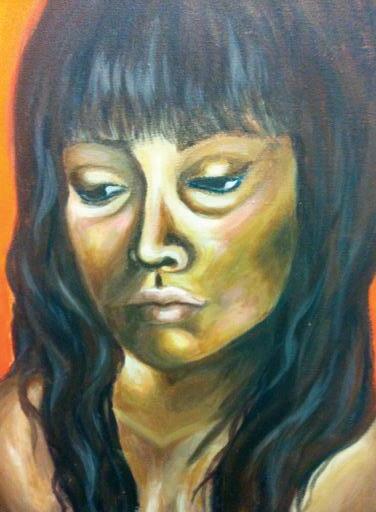
79
Sarah Sparks - grade 11 MACLACHLAN COLLEGE
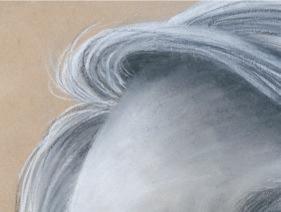
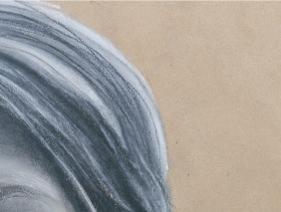
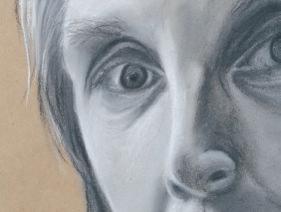
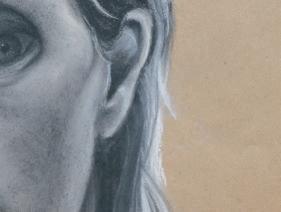
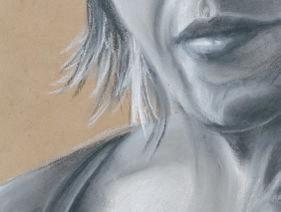

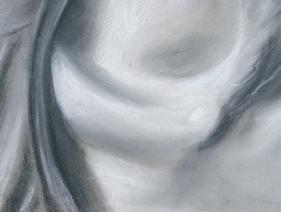
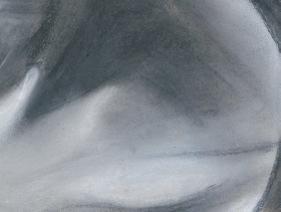
80
Sabrina Armstrong - grade 12 ST. CLEMENT’S SCHOOL
hauntings
By Olivia Parker
it’s not anything surprising if there’s a pattering when i watch
t.v
or when i break the spine of a new book; the tap-taptapping means rest, it means peace, it means mundane acts. ngers can hit remote buttons/ ip pages/tuck hair behind ears but automatic motor actions aren’t in the same family as the tapping. in between beats where the soles of my sneakers hit the tile oor there’s ashes. lightning breaks alongside bursts of laughter; dismissive shrugs coincide with the accelerating beeping of a heart monitor; the sound of cars rushing down a highway at night matches the call of wolf alone in acres and acres of national park. the plastic lining on my sole barely taps the marble before another echo of a memory rings. if the cause of the tapping isn’t unrest or anxiety then it’s of preoccupation. my life isn’t whatever’s on t.v or the line in a novel i’ve read three times over—it’s a network of anything i’ve ever experienced that wasn’t a passing glance. things that may not factor as anything anymore but once held my blind faith as my reason for existing, the core keeping the universe itself from unraveling, a string tied around brilliant galaxies to save them from colliding with each other or imploding within themselves. and there’s a reason i’m preoccupied with these tired ghosts of things that used to mean the world to me, whether subconsciously i am aware or not. these haunting memories de ne all that i am as an individual. they make my thoughts and existence matter, and even though i o en run into “quit it” with my annoying habit, if tapping my foot against the oor helps clean what have become frayed edges of my life back into a neat framing of memories, an ordered list of reasons i exist, then this insistent pattering, this kaleidoscope of haunting ashbacks is much more than welcome.
81
applEBy CollEgE - graDE 11
The first hello
inspired by Disney’s paperman
By Jocelyn Lee
I stood on the train platform with briefcase in hand. e solid yellow line danced across the edge of the platform, almost daring me to cross it. For 5:30, the station was relatively empty. People of all kinds were waiting for their respective trains, each with a story and a purpose. A small child was holding his father in one hand, and a balloon in the other. He might have been on his way home a er a day at the park. He playfully swung his father’s arm back and forth. e father was studying a newspaper, with creases growing across his forehead. His slightly crumbled suit was hanging from his too-frail body, and his fedora showed early signs of wilting due to overuse. Across the train tracks was another platform, full of empty faces. eir tired complexions and hunched shoulders made them look exasperated and they had little interest in the world surrounding them.
As I glanced over my right shoulder, I saw a young lady who stood out from the other people on the platform. She was glowing. Perhaps it was the way her red velvet jacket was tted just right, or the way her beret drooped slightly over her le eyebrow. It could have been the way her hair was combed perfectly except for a few stray frizzles. Like a fresh beam of sunlight, her presence lit up the platform.
Suddenly returning to reality, I shi ed my eyes straight ahead of me. My cheeks ushed red and I hoped no one had noticed me staring at her. I tightened my grip on my briefcase, and looked up at the station clock. e bronze handles were beginning to show signs of wear and tear, as rust began to encompass the minute hand. It was ironic how even a timekeeper could not escape the aging that time brought. Every hour that ticked by would be counting down to the moment when the clock succumbed to old age and stopped working. As every minute ticked by, rust crept up the minute hand, beginning from the center of the clock and stretching to every last edge. Ever since the recession began, the trains were coming less frequently than usual.
e ow of tra c never changed, as more and more people were losing their jobs and therefore not needing the transport that the train system provided.
Growing up in Seattle, I had an average life. My father was a banker, and
82
rIDlEy CollEgE - graDE 11
my mother was a housewife. Even though my parents tried to be there for me, it seems that they had the genetic trait that made them average as well. My father would always say, “Good job, son,” but I never heard him say, “I’m so proud of you and everything you have done.” It wasn’t that he didn’t love me; it was just that he was not the best at expressing emotions. I suppose this is what made me have a bland personality.
I was never one to be social. I’d try to put myself out there but all I could muster was a pathetic whisper. Sure, you could say I fell in love once, if you consider my valentine in fourth grade “love”. I guess if there was one word to describe me, it would be “average.” Yes, there are thousands of other words in our colorful and descriptive language that could describe me just as well, such as “regular”, “normal”, “typical,, or “ordinary”. But I think that average describes me the best because, well, it’s just so average.
I tried to turn back towards the girl. She was unique. A total stranger, yet she made such an impact on me. Her name could be anything: Emma, Sarah, Amanda, or Amber. Yes, Amber. She looked like an Amber. From the way her eyes glowed with passion to the way she gave o an aura of optimism; something hard to nd in times like these. Like a swallow, her freedom was addicting and enticing. If only I could grab her by the hand, look deep into her eyes and know that she was the one. It could be love at rst sight. She could be the one I have always been looking for. Or even more importantly, I could be the one she was looking for. I didn’t even know that I was looking for anything until my eyes found her. is could be my chance. My one and only chance to break free from my shell and explore the realms of the unknown. Don’t get me wrong; I am not dissatis ed with my life in any way. Yet, I feel as though I am simply surviving in a sea of mundane despair. I want to be able to live, not just survive. To experience all that life has to o er, to be able to wake up in the morning with no regrets, to travel to New York City. I crave to live life to the fullest, without having to look back and wish I did something di erently.
But what if that is not the life for me? I nd myself pacing back and forth at night, not being able to sleep. Am I willing to risk everything that I have, everything that I have worked hard for and accomplished just to take a leap of faith and follow my dreams? I hear that some dreams should stay dreams. Maybe mine is one of them. If I approach this woman, it could shatter my hopes. She could reject me or ignore me without reason. She could have someone waiting for her at home. Even worse, she could dislike me.
Out of the corner of my eye, I glanced over at her again, being careful not to move my body. Like a breath of fresh air on a crisp winter morning, she was both shocking and awakening. However, like a cup of tea, she was welcoming and warm. To my dismay, I heard the familiar sound of the train approaching on the tracks. e repetitive rhythm of the wheels running across the wooden boards used to be such a pleasant sound. Right now it was the last thing I
83
wanted to hear. I hoped the train did not stop at this station because if it did, then there was a chance that she would get on the train, and our paths would never cross again. Holding my breath, I squeezed my eyes shut and said a prayer. I was too nervous to look and see if she was getting on the train. Still aware of my surroundings, I tried to be as subtle as possible, making sure I didn’t draw any attention to myself. I gripped my briefcase more tightly and my knuckles grew pale. e train came and le . With my heart racing and my mind spinning, I peeked out of the corner of my eye. Breathing a sigh of relief, I saw that same red velvet jacket standing in the same spot on the train platform. Fate was on my side and the hands of time were in my favor. is woman made me surprise myself. I had no idea that I craved such desires. ese raw, human emotions had never even crossed my mind. Many feelings never explored were suddenly awoken and rising to see what the world had to o er. Life before seeing her was simple, and easy, and uncomplicated. But now that I had seen her, life was invigorating and stimulating. Before I saw her I never knew what I had been truly missing. oughts that I had never even thought of were suddenly coming one a er another. I never particularly liked children, but now I realized that I wanted to have them. Not yet, but years from now. I was confused and overthinking every thought in my head, yet I made no e ort to stop any of it.
Looking back at the bronze station clock, I saw the seconds counting down to my future. I decided I couldn’t wait for one day more. With sweaty palms and shaky knees, I forced my feet to take one step a er another towards her. My stomach was lled with knots and my heart was pounding with anticipation. I looked up into her big amber eyes, and with a deep breath, I stuttered, “Hello.”
84
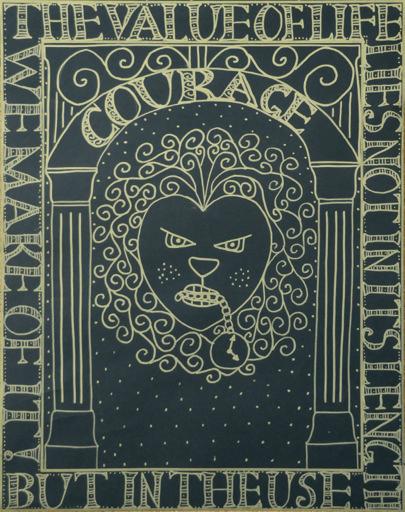
85
Andre Corona - grade 7 CRESCENT SCHOOL
he Started It
By Sarah Wong
“She kicked me in the stomach!”
“He started it!”
“Can you two be quiet for just a minute?” my mom yells.
BANG! My door slams, shuddering in the doorframe, and my brother continues sobbing. My mom sighs in exasperation as she realizes that, no, we cannot be quiet, not even for a minute. I realized this a long time ago. My brother and I have been ghting for as long as I can remember…
I am two years old. I am dos—Dora taught me that. She was on my birthday cake a few weeks ago. I got to eat her face—it was so yummy. I made Mommy and Daddy eat Swiper because he’s mean, and I didn’t want him in my tummy. Bryan didn’t get any cake because he wasn’t born yet. Even if he were there for my birthday, I don’t think that I would have given him any cake. It was my cake, and he already gets my old room and my old blanket. Mommy tells me that I have to share with him because he’s little, and I’m big, but I don’t want to. Why should I give him my things? He will only slobber on my toys, leaving them wet, sticky, and gross. Sometimes, it looks like a giant snail slithered across the toys he touched. I wish that Swiper swiped Bryan when they were both in Mommy’s tummy.
I hear the faint thud of a door closing behind me and the gentle thumping of padded footsteps approaching.
“It’s time for bed,” Mommy whispers. Mommy and Daddy whisper a lot now. ey want me to whisper, too, so that I don’t wake up Bryan. He is so noisy when he is awake. I can even hear his wailing when I’m in the basement and he’s upstairs. What a crybaby he is! I hate his wailing, but I also hate whispering.
“No,” I say obstinately, not whispering, “I’m going to stay right here, right in front of your door, to make sure that you and Daddy don’t visit Bryan at night.”
Mommy shakes her head and walks into her bedroom to speak with Daddy. Daddy comes out of the room and grabs me under my armpits. He begins to drag me back to my room.
“No! I’m staying right here!” Not only am I not whispering now, but I am screaming, my sts ailing in the air, desperately attempting to grab on to the wooden railing encircling the landing, and my feet kicking helplessly against Daddy’s stomach. He only takes a few long strides to bring me to my room on the other end of the landing, but to me, my room seems miles away from Mommy and Daddy’s room. e carpet between our rooms stretches
86
ST. ClEMEnT’S SChool - graDE 11
endlessly, and at night, when the lights are o , it will become an impassable river teeming with shadowy sharks, their stomachs hungry for little children. How will I hear Mommy and Daddy leaving their room from across this dark river? How will I cross it to stop them without getting eaten? I have to return to my spot in front of Mommy and Daddy’s door before the lights turn o , when the carpeted oor is still safe.
As soon as Daddy releases his vice-like grip on me, I dart behind his legs, sprint to their bedroom, and ing myself onto the oor in front of their door. is time, Daddy doesn’t pick me up again. His shadow passes over me as he steps around me to his room. e door closes with a so click, and I am suddenly plunged into a world of darkness.
My heart starts to beat frantically in my chest. ump-thump, thumpthump, thump-thump. Can Mommy and Daddy hear it? ey must, it’s beating so loudly through my chest, through the oor! e moonlight shining through the high window on the other side of the landing re ects over the glass chandelier suspended from the ceiling, but it is more of a source of fear than comfort. It illuminates every stain on the carpet, but leaves the menacing, shadowy corners untouched. In one pool of moonlight lurks a grey, manylegged centipede as long as my body, creeping across the carpet from the giant fronds of a tall potted plant. All across the edge of the landing lie grey bars, imprisoning me in this dark jail. e golden doorknob on my parent’s door winks at me malevolently and mockingly. I bury my face into the carpet and grab stfuls of the coarse material. I ache for my warm, so bed with its comforting, familiar scent, but I have to make sure that Mommy and Daddy don’t leave their room…
I open my eyes and blink, disoriented. e bars and the centipede have been chased away by the sunlight, and the doorknob is dull and lifeless again. I can hear the sizzling of the wok in the kitchen, followed by the salty scent of frying bacon. My mouth waters. I try to sit up, but my neck is so sore, and my back aches. e pain brings back memories of last night, and I am instantly furious with myself. I must have fallen asleep! at means Mommy and Daddy visited Bryan last night. My mind whirls with what they could have done together, without me: maybe they read him my books; maybe they gave him my toys; maybe they showered him with my kisses and my hugs.
Too sore to pull myself onto my feet, I crawl on all fours and with an angry THUMP, drop myself onto the top step of the stairs. THUMP, THUMP,
87
THUMP, THUMP, the hollow sound of my furious bum-shu e down the stairs echoes in the open hall. As my feet touch the cool, tiled oor at the bottom of the stairs, I look up, only to see Bryan blissfully sitting in a fuzzy yellow chair in the living room. My jaw drops—that is my fuzzy yellow chair, and he is sitting on it like he’s the little prince of the world! is nal act of thievery cuts through the throbbing pain in my back to pull me onto my feet, and I march over to Bryan. Looming above the wrinkled, abby intruder with a stormy expression on my face, my back begins to ache with a new intensity, and my head begins to pound. His disproportionately large eyes gaze up at me with a smug expression, and he smiles. I frown. And then, summoning up all of the terror that I felt in the dark last night, all of my anger at having fallen asleep, and all of the pain in my neck and back, I pull my hand back behind my head and whip it across his cheek. Hard. A sharp, harsh sound rings in my ears, and I stumble to my le , my balance temporarily lost from the momentum from my hand and my shock at the violent sound it made. My hand stings.
An angry, red mark the size of my hand slowly rises on Bryan’s jaundiced cheek. en, his face tightens, his eyes close, and his tiny mouth opens to release an enormous, ear-splitting wail. My head snaps up, and I whirl around, body tensed, anticipating Mommy or Daddy to enter the room and catch me red-handed. In the back of my mind I think, this is what Swiper must feel like when he steals something from Dora. But I am di erent from Swiper. I will not be caught. I bolt across the tiled hall, up the carpeted steps, and through the open door into my room. I launch myself into my bed and bury my head under my Barbie blanket, enclosing myself in a so cocoon. Enveloped in safety, embraced by the uniquely familiar scent that only one’s own blanket has, I take a deep sigh of relief, and my heart beat slows. I listen to Mommy’s hushed voice downstairs and Bryan’s wail gradually abating. A strange, uncomfortable feeling creeps into my stomach, di erent from the discomfort I feel from my back and neck, but I quickly suppress it.
A er all, he started it.
88
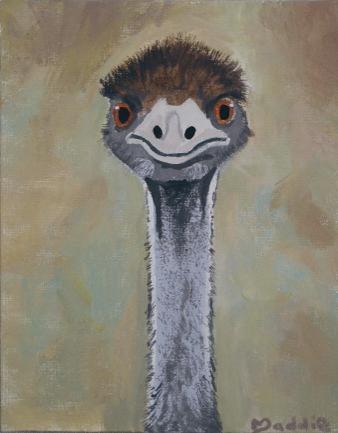
89
Madison Martin - grade 11 COUNTRY DAY SCHOOL
By Sophie Fraser
I sink down into the wicker chair, breathing heavily.
“I ran – all – the way here,” I gasp between breaths, my friend sitting opposite me across the table. “Subway was delayed twenty minutes – have you been waiting long?”
But she’s only been at the restaurant for a few minutes more. I can hear the frustration in her voice as she talks about the endless tra c, but I’m so happy to see her that it doesn’t matter what she’s saying. When the waiter comes by to take our order ten minutes later, I haven’t even noticed the menu pinned under my elbows. As I’m reading the specials, I hear my friend’s phone start to ring. She says, “Would you mind…?”
“No worries,” I say out loud, but in my head I think to myself, “Would you sit down already?” She gets up, smoothes her skirt, picks up her cell phone and walks past the gate, across the patio of the restaurant, and out onto the busy, humid street.
While she’s gone, I start looking around the restaurant. Sometimes I can use up hours just staring into space, looking at my surroundings. It’s incredibly entertaining to imagine the lives of the frantic people rushing by me. I love that chaos, the way little noises blend together to create the racket of a city. I’d feel empty without that constant noise around me. As my friend has her animated conversation on the sidewalk, I hear three di erent ambulances go by, and as their sirens come closer, I feel a burning in my head. It’s like the anxiety a mother feels when she loses sight of her child. en the memories come ooding back and I close my eyes to keep them away.
But that never works.
I wake up in a cold sweat in the middle of the night. Even though my eyes aren’t fully focused, I can still see the outlines of everything in the room. I hear an alarm clock, and I reach for it but I hit my hand on the wall instead. I reach to the other side and wave aimlessly into the open space, trying to nd the button that can shut o that awful noise that’s hurting my head so badly. I ail around for a little while, the whine of the alarm mocking me, and my stomach turning. I don’t know whether or not I’m awake.
e waiter puts our plates down on the table. I thank him and look around for my friend, waving her over. She sees me and holds a nger up as if to say, “One sec, be right there.” I take a sip of my lemon water and wait.
90 her ThE york SChool - graDE 11
I reach for her, for the blue cotton sheets that cover her. I nd them strewn across the bed, as if someone le in a hurry. e mattress is cold; no one has been sleeping in this bed for hours. But it’s only six o’clock; it can’t be that long since she woke. I push myself up onto my feet, step over my makeshi bed made of couch cushions and drag my feet as I make my way into the hall. I am greeted with, “Oh, why are you up so early?”
“Where is she…?”
“Oh, I took her to emergency this morning at about two o’clock. She’s ne, she’s coming home soon.”
“Soon, meaning today?”
“In a few hours… I’m not sure exactly when. Honey, you look tired, go back to bed.”
As I stumble back into the bedroom, I feel pressure on my chest and in my skull. I hold the doorframe for a minute to steady myself. My vision blurs and my head and eyes pound. What is going on with me today? Why is this happening now?
“Hey! Hey, are you okay? You were mumbling to yourself,” my friend says, with a concerned look as she tucks away her phone. I don’t bother explaining; it wouldn’t make much sense anyways. She didn’t know me then, she wouldn’t really understand what I had been like before. e clouds have parted slightly and there is a single ray of sunlight illuminating the street. It cheers me up a little, but the memory is still there. I don’t know what to do with it, so I take a bite of my lunch and start the conversation again, distracting myself from what’s going on. We sit there for a few hours, talking and talking; so much has happened since we last saw one another. We have a lovely time. ***
As I walk into my dark house that evening, I can’t even imagine six years ago. I could never go back to midnight emergency room visits, needles, tubes, takeout dinners in a bare white room. I don’t want to erase that part of my life, even though as every day passes more of it escapes me.
I suppose I am lucky that I haven’t felt fear close to what I felt in those years, but I’m careful not to trigger anything either. I know that if I think too hard about some things, I won’t be able to keep myself together anymore. I close my eyes and listen to the rain pelt down on the windows behind me and sink into the armchair, the one that used to be big enough for the both of us.
I feel her arms around me as I dri o to sleep.
91
Tutti frutti kids
By Noor Khwaja
Karachi reminds me of honey. It’s sticky and warm and sweet and loud, especially in the summer. e sunset blurs the di erent sounds and smells together while spices surf on heat waves.
My cousins and I get in the jeep every evening, and drive to Tutti Frutti where they have delicious frosty frozen yogurt. When you eat it, it sinks down your throat and makes your insides cold. Cold insides when it’s hot outside is the best feeling in the world.
We have to walk across the sandy garbage, up the cement steps where children sit. is place doesn’t look like honey; it’s grimy and grey. It’s like everything dirty went in a blender and then the blender exploded on these concrete steps.
e children are chatting and smiling. eir parents don’t care about them. ey don’t buy them new clothes. When they see us they start to ask questions. Whether we want to buy their old roses; whether we want to buy their outdated magazines; whether we want to buy their dysfunctional plastic toys. We have to ignore them and go inside the store.
e store is the inside of candy land. It’s bright and plastic-y and clean. ere are swirls everywhere and funny bubbly lamps. is is the kind of place where fairies come for picnics. When I’m there, I feel magical.
ere are stations for each avor of frozen yogurt. My favourite is strawberry but it’s not always there.
e man that works there lets me taste the avors, even though tasting is not allowed. He winks at me when we pay and calls me sweetie.
When I get my treat, we go back to the car. I see the kids and remember that I have an extra spoon. I take some of my yoghurt on the extra spoon and hand it to one of the boys.
92
ThE BIShop STraChan SChool - graDE 12
He is confused and stares at what I have given him. He waits for me to take a bite and then does the same, making sure he does it just like I did. en he smiles at me. Every kid likes the taste of chocolate Froyo. My cousins have extra spoons too and suddenly, all the children have a taste.
I wonder if next time they want to choose their own avors. Maybe they would like vanilla better. Vanilla or Raspberry or Caramel-Cheesecake. I wonder if they will go to the store and feel magical just like me. I ask my aunt if we can take them with us tomorrow.
e next day we get in the jeep and we drive to Tutti Frutti. I’m excited today because the children on the steps can see candy land too. We tell them they can come in the store with us and they leap o of the stairs. ey race to the store like they are being chased and jump around as if they have springs on their feet.
ey don’t know how to get the yoghurt. Maybe they have forgotten. I help them and then it’s okay.
e man that works there doesn’t let them try the avors. He doesn’t even give them time to think and makes them choose immediately. ey choose all the colorful ones. ey’re cups look like melted rainbows.
We pay for everything and sit down. e man at the store didn’t wink at me today.
e children can’t sit still and look as if they have swallowed reworks. Everyone around the store is staring at us and at them. e other customers are sitting far away and some are leaving. I wonder if we smell like ogres and that is why everyone is turning away.
My aunt says maybe we should eat outside and we all follow her. We sit on the steps; the blended garbage steps with the other children. We sit with them on the steps and it’s not so bad a er all.
93
a life of necessity
By Mark Cahalan
Life is short. It’s a well-accepted fact, but it’s also a promise. People live in the hopes of a better tomorrow, always looking to the future and the past, and rarely at the present. Is this the road to happiness and self-satisfaction? No. We are constantly reminded of our mortality by disasters and tragedies in the news and the passing of others around us. With such little time on this Earth, living meaningfully is essential, and the driving force behind a meaningful life is necessity, something you can hold onto throughout your life. is necessity doesn’t have to be an activity you aim to succeed in or a position you hope to obtain. It doesn’t even have to be a singular item: it can change over time. However, your necessity remains a road to follow, and a chance for you to live by your own rules and not those imposed on you by others.
Annie Dillard’s “Living Like Weasels” describes her bizarre experience with a weasel at Hollins Pond. As she enjoys a peaceful sunset, a warbler catches her eye, and as she turns she locks eyes with a weasel. In that shared gaze, there is mostly emptiness, yet a shocking ow of emotions triggers a realization inside Dillard. She learns of “the purity of living in the physical senses and the dignity of living without bias or motive” (108). What was it that taught her this lesson? A weasel. One of the purest things about Dillard’s experience is the fact that she was willing to learn a lesson from a creature with lesser intelligence and negative connotations. She is able to look beyond anything that stands in the way of self-discovery and proceed onwards in life. e most vital lesson that Dillard learns from this weasel is that “it would be well… to grasp your one necessity and not let it go… wherever it takes you”(108).
e tenacity of the weasel, even in the face of death, is a principle that we as humans can apply in our lives. If you look back at the end of your life and see boundless tenacity and rigor invested in something you follow instinctively, would you have any signi cant regrets?
I’ve lived the majority of my life believing that one-day some passion or epiphany would come knocking on my door, and I would suddenly know what to do with my life. It is not right to think that way. Slow and steady may win the race, but you can’t win if you don’t participate. I’ve been playing the clarinet for seven years now, and I’m not even close to the level of skill achievable in that amount of time. Even as I write this, I think “Seven years? at’s a long time! Why don’t I practise more?” It’s not that I dislike the
94
BayvIEW glEn SChool - graDE 12
clarinet. In fact, I truly enjoy playing it. When I’m in my room, instrument in hand, I feel detached from all my other work. e warm-up long-tones let warm air ow through the column of the clarinet, livening up the sound. A rush of wind kicks o a low E. e note has a deep, resonating, and ultimately satisfying tone to it. ere is a huge contrast in volumes as I change dynamics from piano to fortissimo, and changing octaves pushes my lungs to their limit. Red faced, I gasp for air. e scales are tricky little devils, with stumbling blocks scattered throughout their varying components. (I avoid them as much as possible).
Beyond scales comes the songs and studies, the truly artful aspect of practice. e music envelops me like a shi ing shroud, and the moment sweeps me up. I strive for a pure, whole sound and owing phrases. e clarinet is a beautiful instrument with a beautiful voice, and I want to do it justice. e di erence between my desire and necessity is obvious here. I procrastinate and put little diversions before the bigger picture. If I was truly passionate about the clarinet, would my spare time be governed by insigni cant distractions, or would I be, as Dillard puts it, “yielding at every moment to the perfect freedom of single necessity?” (108).
What I truly connected with in Dillard’s essay was her line: “I missed my chance”(108). As opposed to being confused about which path to take, Dillard has le her opportunity to seize her necessity behind, or perhaps it le her behind. Her words carry regret, but also recognition of the value of that chance and the importance of seizing it. We can’t always be responsible for the circumstances we nd ourselves in, but we are always accountable for our actions in those situations. Dillard’s experience with the weasel and her missed chance juxtaposed against my own dilemma raises the question: is it better to have loved and lost than to have never loved at all? While Dillard gained from her experience, I have received nothing. I haven’t had that chance. It’s not only having a necessity that is important – the discovery is also essential. Don’t wait for that necessity to come knocking on your door. Get up and nd it!
e person that comes to my mind when I think of tenacity and necessity is Steve Jobs. His biography “Steve Jobs” by Walter Isaacson gives startling insight into his entire life. From a young age, he knew what he was interested in, and he followed it with zeal until his death. His wasn’t always an easy road. He was ousted from the company he started, and later faced cancer. However, he held on throughout and fastidiously stood up for what he believed in: “to create a company that was so imbued with innovative creativity that it would
95
outlive [him]” (xix). e hardships he faced shaped his character, and allowed him to become who he was at the end of his journey. We cannot get anywhere by running from tribulation. Pressing forward through di culty, not maintaining the status quo, makes us who we are. Imparted in his biography are Jobs’ words:
And a lot of us want to contribute something back to our species and add something to the ow. It’s about trying to express something in the only way that most of us know how - because we can’t write Bob Dylan songs or Tom Stoppard plays. We try to use the talents we do have to express our deep feelings, to show our appreciation of all the contributions that came before us, and to add something to that ow. at’s what has driven me. (570)
Jobs was presented with necessity, and seized it at once. He did not let it pass him by, and thus the emptiness of a lack of necessity and the regret of a missed chance were excluded from his life. Just because it wasn’t particularly di cult for Jobs to nd his necessity doesn’t mean it will be so simple for everyone. I can’t say that music isn’t the “right” path for me, that I can’t be xated on it with the same tenacity that Jobs was during his life. Sometimes the biggest obstacle standing between you and a life of self-ful llment is yourself. Don’t let something as human as pride or laziness or delusion stop you, because all you’re doing is resisting. When you nd that one necessity, you will know, because, as Dillard says, “ is is yielding, not ghting.” e most admirable thing about Steve Jobs, and something I hope to emulate, is his yielding. As the weasel grabs onto the eagle and is li ed higher and higher, Jobs seized his necessity and it seized him, never to part.
We may not always know what we want to do or where we want to go in life, and it’s perfectly ne to be that way. ere is no excuse, however, to not go looking for necessity, and if you’ve found it, to not pursue it. Never choose a life of regret over a life of ful llment. Dillard recognized this through her experience, Jobs lived it, and through both of their stories I have come to understand the road I should follow. is necessity of yours, whether you’ve found it or not, might not always take you where your family, friends, or society want you to go. You might not even end up where you originally wanted to be. Yielding to necessity, however, isn’t about the destination. Your journey is dictated by the necessity, and as it drags you along, you’re living life in the purest, most signi cant way. Whether you arrive at your destination or not, your necessity will remain with you always, and there is no greater reward than that.
Bibliography:
Dillard, Annie. “Living Like Weasels.” Pilgrim at Tinker Creek. New York. HarperPerennial, 1988. Print.
Isaacson, Walter. Steve Jobs. New York: Simon & Schuster, 2011. Print.
96

97
Rachel Glynn - grade 11 THE COUNTRY DAY SCHOOL
good loser
By Ben Pit eld
I remember where I was sitting when the announcement came on. Mr. Glaboski had just nished his lesson on radical numbers, which e ectively meant that I had just returned from twenty minutes of gazing mindlessly out the window. Math isn’t hard; paying attention in Math class is. So I either gaze mindlessly, catching up on lost sleep with eyes wide open, or I close my eyes, and let my head drop, and although I close my eyes, this position is far less restful. I dream, not as one does in sleep, but wishfully, of girls, of impossible wealth and unconquerable odds, of people I want back.
e P.A. system, which is normally clear, crackles. Twice it crackles, and then the person holding the mic coughs and begins to talk, and I fade out again, until I hear my name. My head turns slowly towards the speaker lodged in the ceiling, as everyone else’s head turns and gazes at me. Bright and dim eyes. Mockery and concern. e announcement repeats and I rise. Report to the o ce. From where people don’t return. Mr. Glaboski ushers me out, but not before a few choice heckles are red at my back.
I turn right and, dragging my hand along the wall—as is my habit—I walk towards the o ce. Surely this interjection to my education is for some good reason. No one in my family has time or motivation to come pick me up if it isn’t an emergency. My father, a drinker since my mother passed away, forgets at times that he has a son, or, if he remembers, he keeps it to himself. Mostly he sits on the couch watching football and slowly drinks his way through my mother’s life insurance settlement. In fact the only conversation he and I have had in the past several months, face to face, in tones lower than screaming, was him telling me that our savings were no longer enough for university and to “Get a job, or get the hell out.” It wasn’t as much a conversation as a dictation. I turn le at the cafeteria.
None of my aunts, and indeed I only have aunts, would leave their jobs without cause and indeed in none of their eyes am I cause for anything except apathy, and perhaps a little cynicism. I haven’t talked to anyone in my mother’s family since her death. e only thing we share now is blood. Bad blood.
98
CrESCEnT SChool - graDE 12
e o ce is straight ahead now. My father’s family, were they to talk to me, would still see me as a younger version of him.
I have no one else. It’s sad, but at the same time, isn’t it better to be unbroken and alone, than torn between many? I push open the door to the o ce, my shoulders hunch, and I jam my hands deep into my pockets. It doesn’t look like an emergency. No policemen. No men in suits. My dad isn’t here, but that’s probably for the best; he’d just make the place reek of bourbon, and I just know that the secretary would hate that. She wears too much perfume, and has one of those upturned noses that makes you think she goes to wine tastings. She’s never tasted bourbon like my father’s, or blood, like I have, a er he’s tasted bourbon. I mumble something. She points to the principal’s o ce and says something in a nervous voice. Wine taster. e door to the o ce is open, but I’m told to close it. So I do, slowly. Haste can be dangerous. Better to move slowly and blend in. Always better to blend in. Any chameleon could tell you that. I’m told to sit, so I do. e principal looks at me and sighs like he’s got something on his mind. en he takes a sip of co ee and glances behind me. e school’s guidance counsellor is standing there. I guess I didn’t see her. Maybe she is the chameleon. She smiles at me, her sad little smile. I had to go speak with her once when the gym teacher saw bruises on my arms. I told her I played paintball on the weekend, at which she smiled her sad little smile. I don’t think she bought it. She walks over to me and crouches down, putting her hand on my arm. I shake it o lightly. en she looks me in the eye and tells me news that would destroy other kids. ey would cry. Or scream. ey would ask why them. Why now. Other kids would run home to their mother—because that’s the only parent they had le —and break down. I have no one to run home to though. So I do nothing until she is done speaking, and then I rise and do something that really surprises them.
I say, “Good,” and leave the o ce, trailing my right hand on the wall, wondering if I can now a ord to go to university, and whether Mr. Glaboski is nished with radical numbers yet.
99
When Day Comes
By Kevin Todd
I emerge from the foam at the base of the great Stidcli Falls with a mighty gasp of the clean, smooth country air; the swi autumn wind chilling my torso as I step out of the dark waters and onto the so and grassy fringe of the forest with lure in one hand and sh in the other. With this wind comes the expected harmonious rustle and graceful fall of the leaves as well as the unexpected shock of my neck and chest hairs from this sudden reminder of the approaching winter. Odd; normally such a breeze would not make me inch. is I wonder as I embark on the three kilometre walk through the mature woods to my home situated on the west edge of this very forest.
I don’t remember exactly when or why I moved to the northwest reaches of Orinon, but I’ve since come to realize what a fantastic decision that was. My life in this region of the country is a simple one: one of hunting, gathering, relaxing and living. My wife and I have the basics: a comfortable house, land, beautiful scenery of Ho neau Forest to the east and the Chappestic Mountains to the west, which seemed to encompass my whole world with its unrivaled length. en there was Hope. God she’s beautiful; a dream come true to any man of sense: her blonde, owing hair complimented with eyes blue as the ocean and golden silk skin. Every day I lived within her contagious aura of positive energy and every evening was spent in our chambers; our bodies dancing like two rose pedals in a spring breeze: gentle and graceful, yet powerfully erotic and passionate; a dream come true to any man of sense.
One could say my life here is perfect, or at least one would if I knew anyone besides Hope, the mature trees providing home for the angelic song of the nightingale, the clever foxes who outsmart the ill-fated sh, and a few ancient bones scattered by the side of the lightly overgrown dirt trail through the Ho neau. Where I am is where I’ve always imagined I would be in my later years, and the woman I give my love to is certainly someone who brings me as much happiness as I could possibly imagine. So very generally, I would agree with these speculating ‘critics’ of my situation. But like any place, I assume, there are some hindrances. ere was the odd day the sh wouldn’t bite. ere
100
CrESTWooD prEparaTory CollEgE - graDE 12
was our one car which was dented and busted beyond repair. ere were the icy winters. ere were the dreams of the accident.
ere were the dreams of the accident.
Sitting on my so bed’s edge waiting for Hope to return to our chamber, all that consumes me is the thought of the wind from today’s hunt; the chill of the wind; the hauntingly recognizable sting of the swi frozen air I had not experienced for as long as I can remember. Hope was always envious of my resilience to the frosty winters of Orinon while hunting. I don’t feel a thing. I myself always have wondered why I have not felt this pain in so long, but a er 12 or so years in Orinon I have become accustomed and resigned to this sensory absence. Until today.
My unfastened adolescent body jostles in the back seat of a convertible driven by a woman I refer to as Mother, as it slips over the slick road towards the metal barriers until it collides and rolls over down the steep ditch towards the woods inging the weak roof o from the trauma making this woman scream Kevin and making me shout out OH MY GOD, as my body is launched out of the convertible into the windy air toward the woods, while the woman shrieks at me as I y through the winter air while seeing ashes of the wreckage of the convertible against a broken tree as I uncontrollably ip…
And then morning comes. My le leg hurts.
Waking up I feel very peculiar. In the middle of my shin I have a subtle, yet discernible, pain; a pain which I have no recollection of. What is this from? Did I sleep on something odd? Impossible, the mattress frame for my bed only supports from the bottom, so there is no way I could have laid on it. Did Hope accidentally kick me? No, this is more than that. ere is no bruise, no blood, not a single suspicious piece of evidence to suggest anything had happened. Only pain.
Hope is already cooking le overs from yesterday’s catch when I enter the kitchen. As we eat I ask her if I did anything odd last night. You were talking in your sleep again; you had that dream again, didn’t you Michael?
101
**************************************************************************
Her voice was as smooth as silk, almost as if she were singing for me personally with every breath; a dream come true to any man of sense.
Yeah I did, sorry for waking you.
We nish breakfast and we each go out on separate paths, Hope going towards the Chappestics for some air, me going to the falls; the subtle pain accompanying me on my lonely journey through the cold, still stinging wind.
Michael; I’ve called myself that since the beginning of my life in Orinon. It’s not my real name, and I’m not sure why I believe it’s not; my gut just seems to tell me so. I don’t mind however, neither does Hope, so I guess the name will just have to stick. I wonder if that mystery woman I call Mother is screaming my real name as we crash. Kevin.
It has been four years since that rst feeling of wind. Hope has long since disappeared; she never returned from her trip to the Chappestics on the morrow of that rst wind. e pain in my leg has become unbearable.
My body, now acutely receptive of all I feel, has begun to be near impossible to live with. e once subtle sting of a winter’s breeze now forces me indoors to protect my now sensitive skin from the constant freeze. Relentlessly pounding my fragile mind are foreign, concerned voices that have haunted me these past four years with the daily, syncopated battering of my thoughts; wisps of wind that, with unfamiliar voices, bombard my thoughts with that now repulsive name.
Hope seemed to just disappear from my life, practically vanishing from thin air like dust or a eeting idea. And my leg; it is the worst pain I could possibly feel. It is a constant pain that never subsides; one that makes every hair on one’s body stand and makes one grind their teeth uncontrollably; one that makes you think there is an icy, dense branch slowly being pushed through your body.
I can’t live like this.
I make my way to Stidcli Falls and begin to climb to its top, limping. My old body is weak and defeated as I venture up the backside of Mount Stidcli over the now ever-snowy ground. e unbearable pain of the frigid ground combined with the incomparable agony in my le leg motivates me to the mountains highest peak where Stidcli Falls begins. At its edge, I peer down
102
**************************************************************************
Kevin. Kevin. Kevin. Kevin. Kevin.
its steep cli to the quaking wash of water upon the rocky bottom below. I can’t live like this; this pain I’ve come to feel is too much for my fragile body and mind. Under the clouded, relentlessly storming skies, I jump, feeling the windy chill of the now everlasting winter’s air attack my defeated body. A lone sliver of sunlight struggles through the clouds and ignites my back as I fall towards my death; my cure.
And then morning comes.
My le leg is gone.
e sterile air of my room has a strange musky smell; one of dry cotton and worn, coppery gauze and needles and medicine. e chilling thin blanket that drapes my hospital bed smells of old blood and sweat. e droning beeps I hear from the machines surrounding me that monitor my recently comatose state counted every pulse that I myself could feel as a subtle throb where my le leg was once fused with me. “California” by Joni Mitchell was playing lightly as ambience. Joni Mitchell; her voice was as smooth as silk, almost as
103
if she were singing for me personally with every breath; a dream come true to any man of sense. I look to the wall to see a day calendar showing the date to be November 17th , 2013. Now my experiences begin to ood my mind once again: the crash; the wrecked convertible, the freezing wind, my mother screaming, my name. Kevin.
Name: Kevin Dixon
Age: 19
Date of Birth: April 11th, 1997
Spouse: N/A
Date of Admittance: December 4th, 2009
I read my identi cation wristband with disbelief; this can’t be right. When I jumped, I was easily middle-aged. I remember living a life, having a wife, making love, committing suicide. I remember committing suicide. I remember committing suicide.
Everything is clear to me now. I am awake. For nearly four years, I was asleep from the accident. For nearly four years, I had been married to an interpretation of my dream wife; a woman with beautiful physical features and the voice of my favourite singer. For nearly four years, I had lived a fantasy, a beautiful lie, within my vegetated mind. For nearly four years, my body fought to take me away from this internal palace of “perfection”; this internal prison of “perfection”.
It has been four years since the awakening. My mother has long since died; she never survived the accident. e phantom pain in my leg has become unbearable. Every moment I long for my days with Hope, days where pain couldn’t be felt, days in the land of Orinon, a land I have since learned my brain modelled a er Northern Ban , a place I used to mention to my now dead mother as my future retirement paradise. My leg, now a stump, I discovered broke violently o when I hit a tree, landing near the edge of an old dirt path within the woods. No one said they recovered it; it’s probably just bones now.
As I make my way along Chappestic Boulevard, the west border of the city of Ho neau, to the tall building that is Stidcli Seafood’s headquarters to the east of the road, my mind is battered by constant and dominating recollections of the land of Orinon. However, with these tempests, an occasional, ray from the ever hopeful sun still manages to penetrate my mind and enlighten me
104
**************************************************************************
with the familiar slivers of hope from my winter years in that fantasy land. My crippled, still youthful, body, stumbles up the stairwell to the roof as I recall every detail of my last day in that great land. I reach the roof and walk to the edge, where I sit to decide my fate.
I see two routes for my life. is su ering could all be over, and I could jump to my now realistic cure; jump to my inevitable new day as I had done once before. Or I can turn around now and try to su er my way through the rest of my life, always hoping, praying, and longing for a new day. At its edge I peer down its steep side to the quaking wash of cars and pedestrians over the road below. I can’t live like this; this pain I’ve come to feel is too much for my fragile body and mind. Under the clouded, relentlessly freezing skies, I jump, feeling the windy chill of the now everlasting winter’s air attack my defeated body; the blanket of clouds snu the hope of my body as I fall towards my cure; my death.
Day never comes.
105
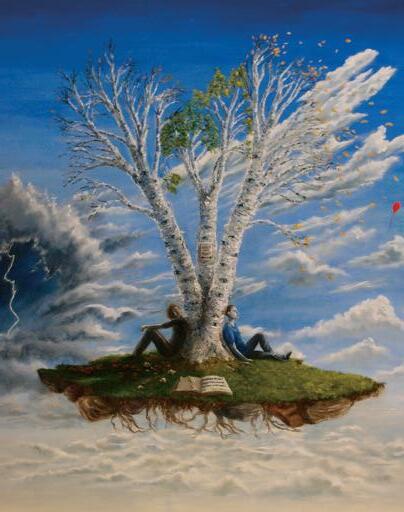
106
Alessandra Pozzuoli - grade 12 THE COUNTRY DAY SCHOOL
Musings on the Digital Era
By Sydney Bradshaw
e older generation say that we are A disgrace
Because we keep making up new words Even though the dictionary is already full. We are disasters because our reality is based On pixels and nanotechnology and hashtags And our clouds store data Instead of dreams.
ey say that we would rather Twerk than work And that to us a 404 error Is more devastating than Death itself.
I am not so sure they are right. Because beyond the glare of screens ere is an e ervescent glow of excitement For a future that is less bleak. e older generation is scared, but we are invigorated.
We are the architects of society, e dream-benders who curate unfathomable ideas, And we have designed a digital world Which we immerse ourselves into To avoid the broken world the older generation Have le for us. We have created our own reality.
107
hIllfIElD STraThallan SChool - graDE 12
post-Modern Shave
By Wajeeh Khan
“We’re open!” said the neon sign outside. I grasped the frigid metallic handle. e silent shiver of my hand stopped. e weight of the door gradually gave to my bodies’ nudge and I sauntered in with something like expectation. e room, however, was uninhabited…aside from the one, no two… ickering tube lights that attracted tiny gum moths to the ceiling, ere were the strands of blonde, beige and black hair on the ground, no doubt containing lice carcasses. Continuing to scan, I spotted several small sapphire coloured seats pushed up against the le wall. To the right were ve special seats, each meant for the customer to be. I sat down on one of those seats.
I found myself actually twiddling my thumbs. I listened to each tick-tock of the clock experiencing an eternity and a half. I could’ve le , could’ve very well gotten up, gotten out, and gotten on with the rest of my a ernoon. I was drawn, however, mesmerized by my own re ection. Not for the reasons you’d expect though — I hadn’t the slightest iota of sex appeal. I stared into the mirror observing the subtle nuances that marked my visage. My spacious snow-white forehead silently trembled. My scru y straw beard itched on top of my sunken jowls accenting a pointed chin. Sapphire retinas darkly gleamed like an ocean of melancholy. I was a primitive, a missing link, a Himalayan Yeti. I kept looking, searching for the very centre of my jet-black pupils, hoping to nd, to capture, or re-capture something; perhaps the why to this incessant waiting; perhaps the joyous freedom of wistful childhood summers; perhaps that disdainful glare on my boss’ mushy face; or perhaps a clue as to my pedantic raison d’être. Whatever it was, it didn’t matter.
I/Eye identi ed my pupils, at that moment, and they quickly receded, frightened. e shivering returned. My heart’s beating raced, vibrating like a taser.
108
12
MaClaChlan CollEgE - graDE
Up until now, I hadn’t noticed the obsidian door that stood directly opposite the main entrance. It opened. Squinting into brilliant backlighting, I examined the gure emerging from the secret room. I thought my mirror would shatter into a million tiny fragments as his boisterous voice invaded my surreality.
“OH! Hello, hello….sorry there pal…I was on break…I meant to close up shop while I was out,” he said convincingly shocked. Our eyes met. His broad sallow face was un-agitated, in fact it was a jovial smirk with gleaming hazel eyes squinting in apologetic indignation. His nearly solacing voice continued.

109
Emily Culbert - grade 12 ST. CLEMENT’S SCHOOL
“Tell you what, I’ll give you a cut, and…it’s on the house. It’s the least I can do.”
I nally spoke, clearing my tar-paved lungs while staring at his thick Adam’s apple. I said with wretched in ammatory hesitation, “ at would be lovely. ank-you.” Frantically scuttling, his hand extracted scissors from within the special drawer in front of me.
“So…what style do you want?”he mustered.
“No style,” I curtly responded. “All I need is a quick trim, precisely one inch; no shave.”
“Fair enough friend, fair enough.” us, the snipping commenced. His hand oscillated over my scalp, looking to meticulously slit each individual hair follicle. His mouth blurting, bantering on about shallow sports, withering weather, mundane monopolies, more and more; truly tiring, uselessly uninspiring; cumbersome commencements of conversations. At some point, my fading intrigue must’ve eventually clicked inside his cerebrum. His unnervingly silent state suppressed my muscles’ shivering. Quietly clipping away, I noticed his right hand slowly reaching for something from the special drawer. I was afraid that I knew where this was going. at spray bottle will not be the premature ending of this event!
“ at’s the wrong bottle!” I yanked out in panicked desperation. He seemed surprisingly sensitive to my sudden shriek.
“What’s the problem?” His confused, shivering tone bounced o the mirror into my eardrums as pleasing pressure waves.
I whispered, “I need…gel.”
“What was that?” he asked.
“GEL!” I shouted.
“Oh! Sure, um…if you want gel, I can,” hesitating, “once I’ve sprayed your hair.”
Who could be content with that kind of empty thinking?
“I demand a dash, a small dab, of gel. en, you can spritz.” I can’t quite recall his remark, but he, nevertheless, pursued my inference. He caressed my scalp with the palliative gel before spritzing.
When he nished, I announced, a er inspecting my image in the mirror. “
at’s not right. It will need to be washed. Could you wash my hair please, sir.” ere was a long pause. I saw his large Adam’s apple bob. Somewhat without passion, he rinsed and washed my hair. e tube lights ickered.
With new determination I said, “Actually, could I also get a shave?” at was for the jovial smirk earlier.
He stroked his lavish cocoa beard.
“Most de nitely, a shave,” I told him. Surprisingly quietly, even perhaps, submissively, he started rubbing the vanilla cream across my face. It was
110
refreshing, reinvigorating. What an auspiciously riveting rebirth it was! “Yes, a little more there … that’s it.”
When he had lathered me to my satisfaction, he reached into the special drawer and drew out the razor. Like a hypnotic bauble, he ashed the razor in the bluish haze of the overhead tube light sharpening it along the leather thong that hung from the side of the special chair. I eyed him ever so attentively in the mirror. en, sliding the blade up beneath my chin like a snake approaching, he brought it devilishly close to my le jugular vein and leaned into whisper hotly, “I don’t know what you’re game is bub, but you’re about to lose.” All of the trembling in my body stopped instantly to listen. “When I lower this blade from your throat, you’re going to get up, get your things and get out of my barber shop, never to return. Do you understand me?” My eyes nodded yes. e night’s frigid metallic breeze sent shivers down my spine. A quick smirk came upon my face walking along Meridian Avenue. My face was still fully lathered with vanilla cream. I reached for my cigars and stopped to light one. He said that I had lost whatever game it was that I was playing. In fact, I had won. I was elated. Indeed, we had both won. For you see, my game is schadenfreude. e German word means, roughly speaking, “taking pleasure from misery” -- my misery, his misery, our misery. It’s a special technique for transcending my post-modern puzzle. It relieves subconscious tension while at the same time promoting mental integrity. Simply brilliant. A little pondering and I think that you will agree.
But I am trying to keep it a secret. I hope that you can appreciate that too much knowing about it will spoil it for everyone.
111
lost and found
By Adam Aucoin
Everyone has lost something. Be it a possession, a skill, or another person, we have all dealt with loss. Most people have been lost themselves, both literally and guratively. Loss results in the need to cope and, therefore, new opportunities to learn about oneself. Is it true, then, that loss is the key to discovery? at one might be lost and found?
It is early in October of 2008. I am about twelve years and three months of age. I am not at home nor at school, but some 120 miles north of Toronto, Ontario at Camp Onondaga, near the Queen Elizabeth II Wildlands Provincial Park. “Wildlands” is far from an appropriate name, as I soon determine. As this is a school-run outdoor education “adventure,” all the whats, whens, wheres, and hows are predetermined, and will not be deviated from. Nothing wild here... at least, not yet.
Our chance for relative freedom arrives at approximately three o’clock in the a ernoon. is desperately sought “free time” brims with possibility. My classmates wander around, chat, or play games on the moist brown camp ground, scattered with cabins, evergreens, and sitting logs, and under the looming grey sky, against which trees with pale green leaves are lifelessly leaning. Dressed in my brown ski jacket, blue jeans, and brown hiking boots, I wander near a steep hill at the far end of our camping grounds. And just like that, I decide to take a stroll. Whatever the stereotype or generalization associated with the need to be alone or to take a walk may be, it does not apply here. ere really is some ine able quality or sanctity to a quiet walk through the forest. Yet, it is not for that reason, either, that I proceed, because as soon as a destination or purpose is introduced, the sanctity is promptly eclipsed. I might say I proceeded because I felt like it. To me, it is rarely a question of ‘why’ and more typically of ‘why not’. Branches brush unforgivingly against my face and winding roots tug at my treading feet. At my pace, di culty lies in both seeing them come and seeing them go. As it seems, the only entity of a changeless nature is the overcast sky, at which I occasionally glance. Scrambling up mounds of dirt and leaves and slipping down slopes, I stumble upon a sort of teepee, messily yet quite correctly constructed using sticks and leaves. Still on camp property, at least. Walking past, I note that it will act as a marker or reference point upon my return to camp. If only things could be that simple.
112
royal ST. gEorgE’S CollEgE - graDE 12
No wind today. Only the rustle of leaves beneath my feet and my consistent breaths are heard. My eyes uselessly dart from place to place. No trail to follow, no signs to obey, no direction. Time is the only remaining factor. Without my acknowledgement, the invisible sun crawls along and the clouds move by. And so, I walk... and walk... and walk.
Passing through a family of birch trees, I meet once again with the distinctive marks on the trunks that appear to be eyes, watching my every move. I hypothesize about how every birch tree in the world watches and observes, quietly. Discreetly. is is why they are o en found in groups - I have this conception that all of them, everywhere around the world, work as a team: seeing independently but thinking and recording collectively... as one. What has happened? I nd myself breathing quickly. Where am I? How long has it been? My eyes look to all directions. e trees begin to move by more quickly, almost as fast as my thoughts. Suddenly, I stumble bewilderedly into an overgrown clearing, enveloped by entangled weeds and surrounded by a rotting, blackened wooden fence. In the middle sits an abandoned and dilapidated wood-and-iron building: the camp’s old meeting lodge. Just before shying away from the eerie compound, I discover a trail leading away from the lodge, in what could be the direction I have wandered in from. Struggling to follow what I am grateful to have found, for it is as thin as twine, I see it fade away into the mud and am le haplessly scanning the circumference of my world. I vividly imagine darkness falling. Trying to make a re. e Unknown lurking in the darkness

113
Adam Aucoin - grade 12
ROYAL ST GEORGE’S COLLEGE
between the trees. I begin to run. From what, only the birch trees know.
Everything is the same – the light, the trees, the leaves on the ground, and the lifeless sky. e journey seems to end as it started. I spot the boulder up ahead, the one about the width of one car and the height of two. e inimitable sense of familiarity hits instantly. I sprint towards it, and, as I stand on top of it, I am the most excited I have ever been to see an outdoor basketball court, and an empty one at that--ironic, considering my dislike for every sport except skiing. I jump down from the boulder, on which we would always play, walk onto the court, for which I feel a sort of instantaneous love, and past it, back into the familiar misty atmosphere of the camp, in perfect time for dinner. No one will know. ey need not know. Do I even need to know?
At rst, this experience meant nothing. For years, it was simply a time I was lost. Now, everything falls gently into place, like autumn leaves or winter snow akes. It was the forest of life through which I was travelling. At that particular time, everyone, including myself, was looking to nd his place in a complicated world – a world not unlike the forest itself. Life can o en begin, just as my little adventure did, with no clear trails to follow and no signs to obey. Navigation – nding your trail in the forest of life – is the challenge we all face at one time or another. Not all trails lead somewhere, as I stressfully discovered, but the trick is learning to spot them and carefully follow them. ey may even connect to our past, as much as we might want to avoid it. I had almost shied away from the clearing with the old lodge, or, perhaps, my past, and nearly missed the trail to my future.
e birch trees, too, are meaningful now, as a representation of self-re ection. ose eyes, always open and staring, on the trunks of the trees are admittedly my own – everyone’s own. is is why the trees see independently but think as one: we may examine ourselves from many di erent perspectives and in various contexts, but the conscious mind, of which we have only one, is our only tool with which to do so. ey know what I was running from out there. at means I know, too, what I feared and ed.
What was the Unknown that lurked in those woods at night? Somehow, I knew all along. It was solitude... loneliness. I discovered, quite simply, that I appreciated all those I lived with, and all those with whom I was somehow connected. With that, came the importance of the birch trees and of the old lodge, and of everything else. Today, I accept and cherish everybody, no matter how upsetting, annoying, or negative they might turn out to be. Without them, I would nd myself spending night a er night in those woods.
Do I suggest you take a walk and get lost in the forest? Strangely enough, you might nd a lot more than you lose. You might become lost and found. I know I did.
114
untruth
By Ashley Weinstein
Everything you know is a lie
Everything you’ve been told
Told about trust
Told about who not to
To create a false reality
To escape reality
Reality is ugly
Reality is what we believe
Believe in God, in faith
Believe in their lies
Lies made to deceive
Lies to destroy the self
Self-awareness is key
Self-belief is strength
Strength comes from within
Strength within the soul
Souls nd one another
Souls searching
Searching for an answer
Searching for a truth
Truths turn into lies
Truths made from promises
Promise you wont leave
Promise I’m the one
One day everything changes
One lie manifests
Manifests into reality
Manifests into your heart
Hearts are fragile
Hearts shatter like glass
Glass tears fall
Glass thrown at the wall
Walls built o beliefs
Walls broken by truths
Truths built with bricks
Truths that can crumble
Crumble with your love
Crumble into ash
Ash le from the re
Ash burnt from their lies
Lies made into beliefs
Lies meant to cause pain
Pain comes from words
Pain is not from sticks and stones
Stones meant for sinking
Stones like your faith
Faith…
Sinking…
115
ThE CounTry Day SChool - graDE 12
alex and his Terrible horrible no good very Bad Driving
By Alex Bowlin
I guess my bad driving kind of makes sense due to genetics, but it seems like I ended up with too many qualities on the negative side of things. My dad is normally a good driver, except for his tendency to destroy cars from the inside out and for the times when he gets severely pissed at the dude who just cut him o , which he responds to by driving an inch away from the car’s back bumper, leaving you in the passenger seat thinking, “ is is the moment I die.”
My mom is also a pretty good driver but sometimes nds the need to drive at one exact speed, braking or accelerating depending on which side of that number she’s on, kind of jerking the car back and forth ever so slightly just getting you a little bit car sick. And then there’s my grandmother, who is usually marginally, just marginally, psychopathic on the road, who bombards the inside of her car with lemon scented Lysol in a successful e ort to eliminate 99.9% of germs while giving you a little bit of a chemical induced buzz.
But out of the three I am by far the worst. I’m an impulsive, unaware driver with a poor sense of direction who prioritizes music over everything else, hates the stupid 60 kilometres-per hour speed limit that seems to be slowly surrounding my house and community, and can easily be distracted by anything colorful that may be on the side of the road. It’s a real struggle to go from A to B without almost dying or getting lost.
My driving instructor tried to boost my con dence a little by giving me high scores on the practice test, but the grades seemed too much like a student who didn’t know any of the answers on a multiple choice test: “8, 8, 9, 9, oh I should throw a 7 in here somewhere, 7, 8,8, 9…”
On my rst attempt at getting my licence, I arrived at the test centre and waited. Sitting in the car, watching the testers in their blue polos walk by through the glass of the windshield, I felt like a dog at the pound waiting for some kid to beg his parents to buy me.
A tester approached my car and I brightened up – then I remembered that I couldn’t drive. My instructor got out of the car and talked to him for a while.
ey seemed like friends so I was hoping that would be enough for the tester to show some mercy on my soul. I was wrong. e tester was an evil man, an evil man with a strong accent. He barked out orders like a drill sergeant which made everything choppy, and my brain needed a minute to translate whatever he said.
116
ST. anDrEW’S CollEgE - graDE 12
ree minutes into the test, we were in a neighborhood area going straight when the instructor commanded me to do something. My brain interpreted this as “Le ,” and I located the turn up ahead. A few seconds went by and he shot up his nger pointing out the le turn he wanted me to make, which was coming up immediately, not the one up ahead I thought he meant. Here a normal driver would have said, “Oh, I’m sorry sir. I thought you meant the one up there. Can I do a three-point turn and correct my mistake?” But not Alex Bowlin. Alex Bowlin says, “I can so make that turn,” and swerves into it Tokyo Dri style in the middle of a neighborhood, where there’s plenty of chipmunks and kids around to turn into temporary speed bumps.
I didn’t realize that what I had done was bad until a er the turn was over. In the moment it was pretty awesome. I drove on hoping that he didn’t notice but he was scribbling stu down and recovering from a mild heart attack. e rest of the test was very curb-involved, which is generally frowned upon, capped o with a teacher induced brake on a turn (a turn that I would have made perfectly
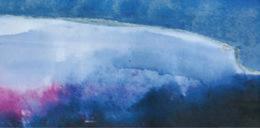

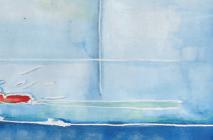
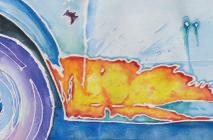

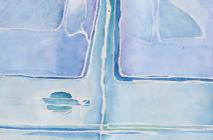
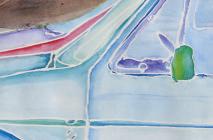
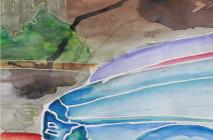


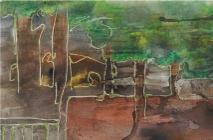
117
Victoria Mercer - grade 12 ST. CLEMENT’S SCHOOL
ne), which is an instant fail.
I know some people who failed their driving test once but no one who failed twice. If I failed twice, there was a pretty good chance that I was going to fail a third time, and a fourth time, and a h time, and then I would wake up one day as SpongeBob, which usually isn’t awful, but driving-wise terrible.
My second time around, the tester’s name was Big Ed. I call him Big Ed because his name is Ed and he is big. He introduced himself as he slid the seat to its furthest back position and plopped in the car which made it bounce a little bit, and made me laugh a little bit. e actual test was much like the last one, very curb-involved, even more than the last one. I managed to hit the curb during my three-point turn. On the parallel park, along with the curb, I hit and knocked over eight glass bottles. Most testers would have considered these to be negatives, but Big Ed kind of made up excuses for me on why I was doing poorly. Hit the curb on three point turn? “Oh, you just need to calm down a little bit.
at’s okay.” Knock over the bottle and hit the curb on the parallel park? “I’m sorry about the bottles. at really just isn’t fair, you having to deal with them while you’re trying to park.”
He was kind of justifying passing me as I was bombing the test. It was pretty cool. en I got teacher-braked again, which felt like getting punched in the stomach. I don’t remember if Ed said anything a er that. I drove back to the testing place, parked the car and prepared for the worst.
“Well,” Big Ed began, “you hit the curb a bit. Try not to do that. Me braking at the end part there, that’s usually an automatic fail but you seem to have good road skills so I’m going to pass you.”
In disbelief and slight hysteria, I checked back with him making sure that I heard him correctly ve or six times, then had a moment similar to when Mario jumps up and yells, “Yahoo.” I thanked him close to forty times as I was leaving because he had just become my hero, but Ed said there was no need to. I didn’t understand this, but my confusion was buried under a lot of joy, rainbows, and butter ies.
To me, Ed is a freedom ghter, a person who, according to Wikipedia, is engaged in a struggle to achieve political freedom for themselves or obtain freedom for others. Unlike his more violent international counterparts who use weapons and malicious tactics, Big Ed joins the likes of Ron Swanson, who use their low level government positions to liberate their fellow man by being generally ine ective foot solders for the higher ups. Passing me was a total disregard for the value of safety over freedom in a very Tyler Durden moment to let what does not matter truly slide. For that I am forever grateful.
118
prospects of My generation
By Jordan Morello
If one were to take a snapshot of my generation, it would be hard to argue that we have prospects of any sort. People would see a generation of spoiled, narcissistic brats with an enlarged sense of entitlement who think the world owes them something for their mere existence. ey exist merely to complain and post sel es on Instagram, their own little digital portal of self-absorption and arrogance. e only thing my generation exists for is consumption—endless and needless consumption of the hottest item. Instead of detaching ourselves from this corrupting trend, we choose to invest our respect in idols that only end up disappointing us. is eventual disappointment only helps contribute to the growing nihilistic and cynical sentiments that slowly poison my generation’s attitude. All this does is leads us into an unstoppable cycle in which we only live for super cial matters that end up failing us. We try and nd solace from our disappointment in our phones and computers, but they too cannot ll the void; they only make us feel more empty and alone. All these factors and in uences strip away the positive prospects my generation had, and leave us doomed to a fate of alienation and nihilism.
One of the parts of the problem is the changing of attitudes on the part of my generation. Instead of being hard-working, diligent people who recognize that the world does not revolve around us, we have become arrogant and narcissistic, to the point of parody. is is re ected in the way my generation uses technology. We’ve become so self-centred that we think daily updates on Twitter or Instagram about what we’re doing or what we’re eating is important enough to share with everyone. If someone calls us out for our mistakes, we de ect blame because how could someone so important and necessary to civilization life myself fail? When faced with injustice in the world, we merely sit on our rear ends and put out some lazy tweet that passively condemns the issue at hand. at’s all we do. Similarly, when faced with a challenge, our resolve breaks, and we resort to complaining like children instead of acting like the adults we are supposedly turning into. We have simply become a generation intent on taking the easy way out and avoiding work. ere is an unfortunate reality about the world that my generation has not learned en masse. And that is that the world is not fair and never will be fair. We have not learned this lesson, and we have not adapted to this reality.
119
vIllanova CollEgE - graDE 12
Where my generation fails yet again is in our unquenchable need to consume. It covers every category, from the latest iPhone to the hottest piece of clothing. It’s now an inherent part of my generation’s culture, to the point where these things are not wants; instead, they have become needs. When we must have everything, we no longer put value in worthwhile things, like family or ethics. Instead, these become obstacles to the goal of getting what we want—a mere formality in my overly consumerist generation. is consumerism by itself is not bad; in fact, it sustains our economy. But when it becomes the only objective, or a way of nding meaning in a cold world, it becomes an issue. While it’s an issue that a ects all of society, my generation has the opportunity to stop this sort of unstoppable desire. However, the chances of this seem slim. My generation, the o spring of the mostly well-o baby boomers, is used to being stuck in this capitalist culture. erefore, we only continue to perpetuate this problem, and thus continue to risk diminishing our prospects as we move forward. Our unprecedented need to consume extends to media as well. With this exorbitant amount of media consumption, we eventually idolize the celebrities that the media enshrines. is proves to be detrimental, especially when these celebrities face their inevitable downfall. One could look at celebrities like Miley Cyrus and Lindsay Lohan. Both are celebrities that my generation has grown up with and, while not everyone idolizes them, they are a re ection of what my generation values. ese values are things like sex appeal and who can be more risque, which are two things that have no real substance to them. And when these celebrities fall, whether it is Lohan’s mental breakdown or Miley’s tasteless exploration of the art of provocation, we become jaded. A er all, how good can we be when even our own idols disappoint us? is sort of poor idolization applies to celebrities who have not su ered a fall from grace, too—people like Kanye West are perfect examples of this. He may be an artist who is not afraid of pushing artistic boundaries, but his overbearing, narcissistic tendencies overshadow any sort of positive artistic elements he contributes to society. Despite this, people still look up to him as a role mode, as a gure to emulate in the hopes of reaching his level of success. Like Lohan and Miley, this idolization speaks volumes about what my generation values and respects. When our idols fail, we feel bad, and become hardened as a collective, intent on never being disappointed by an idol again. It’s a self-defeating cycle that has slowly maimed my generation’s chances of success, and eventually leads us down a path of selfimposed alienation.
Faced with continuous disappointment and shallow, unsatisfactory items, it’s no wonder my generation constantly buries itself in their technology. We hide behind social networking sites that claim to connect us, but only end up pushing
120
us away from one another. Instead of having face-to-face conversations that can be meaningful and connecting, we detach ourselves from the humanity of interaction by relying on short, mind-numbingly trivial interactions through texts and tweets. By relying on these for communication, anything said via text or twitter can be misconstrued into something entirely di erent, all because we can’t sense the tone or emotion in a person’s voice or face. Our ability to socialize is a de ning feature of humanity that has dramatically changed the course of history many times. But this ability is being twisted and contorted as a result of self-destructive behaviour that can only be damaging, as we alienate ourselves behind a screen.
As a collective generation, we are doomed to a future of nihilism and alienation. We have become self-absorbed, lazy children to whom the idea of hard work is a foreign one. Instead, we centre our existence on pure, unadulterated consumption. Our need to consume extends to the media, which leads us to idolizing shallow celebrities who eventually have a breakdown or outburst that disappoints us. When faced with this inevitable disappointment, we isolate ourselves and begin the process of losing the social part of our humanity. ese factors are all pieces in the puzzle that is our future. But these pieces are not put together in the case of my generation, which is an idea that can be troubling. While it may be a bit of a cliche to say a generation is doomed, it unfortunately may be true in this case.
121

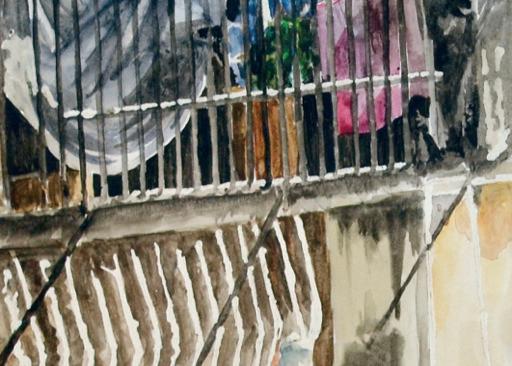
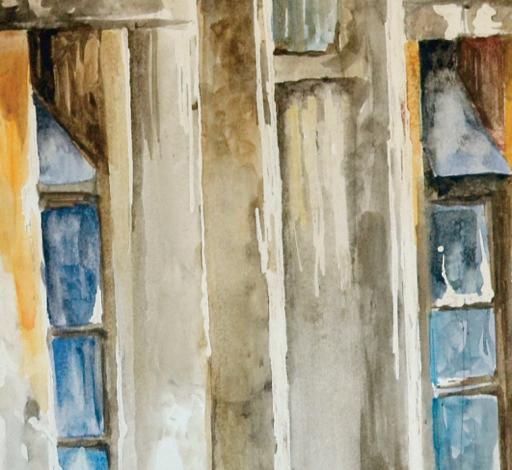
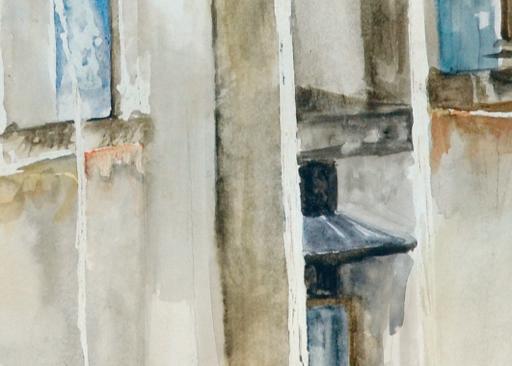 Lavina Li - grade 12 ST. CLEMENT’S SCHOOL
Lavina Li - grade 12 ST. CLEMENT’S SCHOOL
remembering Eamonn
By Eamonn O’Kee e
Death leaves a heartache no one can heal, love leaves a memory no one can steal. –Headstone in an Irish graveyard
A drive through the Irish countryside is a violent experience. Crossing a pastoral landscape scarred by ancient glaciers, narrow winding roads wreak havoc on hapless passengers.
Long ago, great ice sheets pulverized rock creating an arctic wasteland. e Irish Elk, a colossal cervid boasting six-foot antlers roamed the barren tundra. Ten thousand years ago the ice thawed and this regal creature, Megaloceros giganteus, disappeared from the Hibernian wilderness. Crowned by a majestic headdress, it now lies ossi ed in the dregs of a Leinster bog.
Nature destroyed both the deer and its hushed surroundings. e sterile glacial moonscape gave way long ago to bucolic meadows. To imagine windswept tundra in place of this pastoral scenery challenges credulity. Nature destroyed the silent stomping grounds of the Irish Elk over the course of two hundred generations.
Each summer my family returns to Ireland to visit my father’s homeland. On this trip, the meandering roads induced a nauseating daze. My headache, triggered by the jarring journey, precluded any attempts to appreciate the landscape as we passed the tranquil rolling hills and verdant valleys of County Kilkenny.
Once the underbelly of an icy colossus, my aunt’s dairy farm lies on the gentle windward slope of a vale in the parish of Glenmore. e farmhouse, a fresh addition to the landscape, squats amongst fallow pastures. A tarmac driveway leads from the road to the dwelling. Navigating past grinning relatives, my father cautiously steered our car to an available parking spot. Aunts, uncles and cousins swarmed like honeybees. Some were familiar while others required an introduction. All were gathered to remember Eamonn O’Kee e.
Twenty years ago, as my grandfather Eamonn prepared for heart surgery, my father wrote him a letter as if it was the last he would ever receive. Eamonn O’Kee e, my namesake, underwent the operation but never woke up.
My father, I am told, delivered a stoic eulogy at the funeral. He paid tribute to an industrious man – the eldest of twelve children.
Twenty years later, my father organized a reprise of his panegyric for the
124
uppEr CanaDa CollEgE - graDE 12
extended O’Kee e family. irty people sat or stood in a mid-sized living room. Large sliding glass doors punctuated the cluttered crimson walls, o ering a sweeping vista of the valley. My restless young cousins dgeted and rolled about on a couch.
en my father stood. He glanced at the baby coddled in my aunt’s arms. He looked at his own children and observed his composed mother. My father began to string sentences out of thoughts pent up for twenty years. He spoke of my grandfather’s character, generosity and love for his family.
Catherine, the newest member of the O’Kee e clan, soon began to cry. My father gazed at his two nephews on the couch as their miniature limbs ailed wildly on the cushions.
“If Dad saw us now,” my father re ected, “wouldn’t he be proud?” Choking up, he paused now and then to collect his thoughts. Tears welled in my eyes; I had never seen my father cry. I had never understood the depth of his feelings for a man I had never met.
Heartbreak and anguish weighed upon me like a leaden yoke as the epitaph reached its apogee. Holding back tears, my father asked: “If Dad were alive today, what would he say?”
My grandmother, Eamonn’s widow, broke her silence: “He’d say: ‘God bless us all.’” e room murmured in approval.
A erwards, I wandered on the tarmac outside the farmhouse, sobbing and gazing across the valley. I wanted to be alone–to cry alone. I found myself weeping for a man I never knew.
Now I understood why my father had always insisted on spending time with me. I nally fathomed his reaction whenever Luke Vandross’ Dance with My Father played on the car radio.
I cried to myself alone, arms crossed, under a golden late a ernoon sun. My father walked over to me. A mutual understanding rendered speech unnecessary. Neither of us could bear to make eye contact. I looked out towards the distant green hills. I didn’t want him to see my tears.
“You made him proud, Dad,” I said, “I hope I can do the same.” George Eliot once wrote: “Our dead are never dead to us until we have forgotten them.” My father taught me about Eamonn’s character. He taught me of the love between father and son. I thought of the man I would be and queried: “How will I be remembered?” One day, I too might deliver an epitaph for my father.
I stared out over the valley as I embraced my father. I gazed towards the northwest, where Eamonn O’Kee e stills rests in peace beneath a glade of trees in the roo ess nave of the ancient monastic church at Kilree. e noble Irish elk, a creature I admired yet had never known, slumbered beneath the bog.
125
lIST of parTICIpaTIng CIS onTarIo SChoolS

Appleby College
Ashbury College
Bayview Glen
e Bishop Strachan School
e Country Day School
Crescent School
Crestwood Preparatory College
Havergal College
Hill eld Strathallan College
Lake eld College School
MacLachlan College
Pickering College
Ridley College
Royal St. George’s College
St. Andrew’s College
St. Clement’s School
e Sterling Hall School
Upper Canada College
Villanova College
e York School
126
2014 WInnErS
Middle Category - grades 7 & 8
First Place: CLARE TREMAIN, e Bishop Strachan School
Second Place: SIMON ORMSBY, Royal St. George’s College
ird Place: DEVIN LEE, Upper Canada College
Honourable Mentions: GEORGIA GARDNER, Crestwood Preparatory College
JEREMY GARBE, e Country Day School
Upper Category - grades 9 & 10
First Place: PASCALE METTRICK, St. Clement’s School
Second Place: MING SCOTT, Ridley College
ird Place: BENJAMIN MCDONALD, Upper Canada College
Honourable Mentions: MARY-LAURE NEW, Appleby College
HANNAH BRUNO, e York School
Senior Category - grades 11 & 12
First Place: JULIET GARDNER, Lake eld College School
Second Place: NOOR KHAWJI, e Bishop Strachan School
ird Place: OLIVIA PARKER, Appleby College
Honourable Mentions: ALEX BOWLIN, St. Andrew’s College
BEN PITFIELD, Crescent School
127















 Alexandra Radivojsa - grade 12 MACLACHLAN COLLEGE
Alexandra Radivojsa - grade 12 MACLACHLAN COLLEGE



































 Lavina Li - grade 12 ST. CLEMENT’S SCHOOL
Lavina Li - grade 12 ST. CLEMENT’S SCHOOL